|
Postcards from:
Big
Bear Lake
Hong Kong China
Bangkok
Thailand
Calcutta
India
Guwahati
India
Shillong
India
Kaziranga
India
Agartala
India
Dhaka
Bangladesh
Bodhgaya India
Varanasi India
Agra
India
New Delhi
India
Kathmandu Nepal
Bangkok Thailand
Xi'an China
Tianshui China
Lanzhou
China 1
Urumqi
China
1
Turpan
China
Korla China
Kuqa China
Aksu China
Kashgar
China
Urumqi China 2
Bishkek Kyrgyzstan
1
Cholponata Kyrgyzstan
Balykchy Kyrgyzstan
Bishkek Kyrgyzstan 2
Almaty Kazakhstan
1
Zharkent Kazakhstan
1
Almaty Kazakhstan
2
Zharkent Kazakhstan
2
Korghas China
Yining China
Urumqi China 3
Dunhuang China
Jiayuguan China
Zhang Ye China
Wu Wei China
Lanzhou China 2
Zhongwei China
Yinchuan China
Shanghai China
California USA
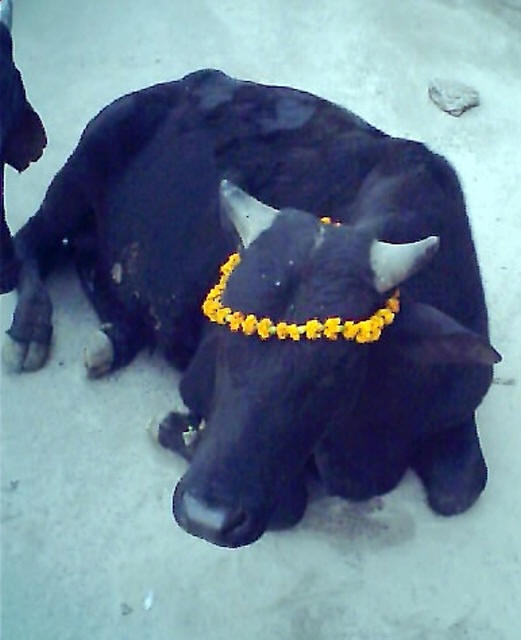
VARANASI: Someone with a sense of humor
draped flowers over this cow.
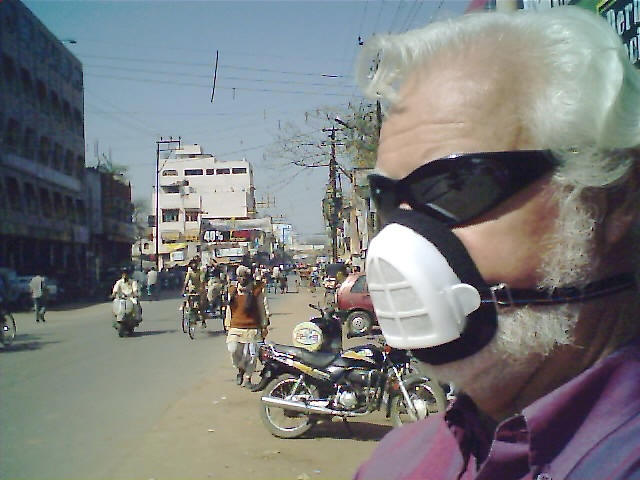
VARANASI: People continue to stare at me, but the looks have changed
whenever I put on the mask, something necessitated by coughing fits.
Filtering out the dust has helped a lot with the chest tickle. People here
must have a lot of respiratory problems.
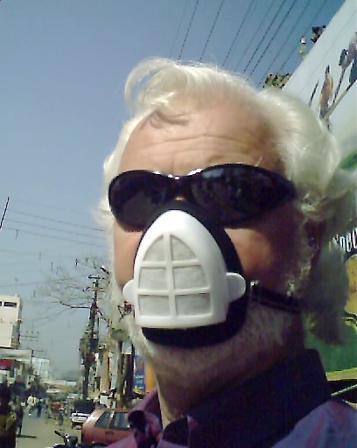
VARANASI: Wonder why people are staring at
me? At least I can breath without coughing when wearing my spaceman mask.
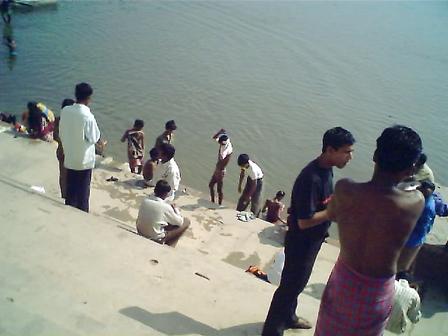
VARANASI: A typical scene along the banks of
the Ganga River in the area of the Ghats, stone stairs leading down into the
river.
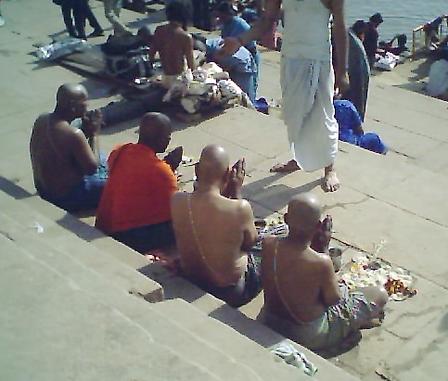
VARANASI: On
the steps of a Ghat here showing four holy men doing yoga and chanting as
the fellow in white receives their blessing.
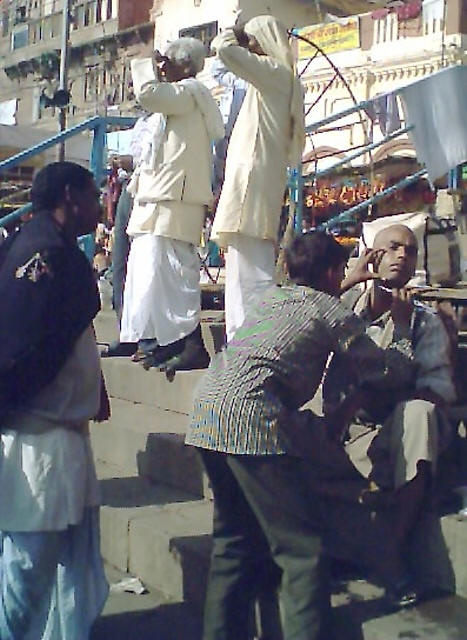
VARANASI: On the steps of a Ghat here showing a street barber at work on a
pilgrim who has just had his head shaved... to become another "holy man" I
presume.
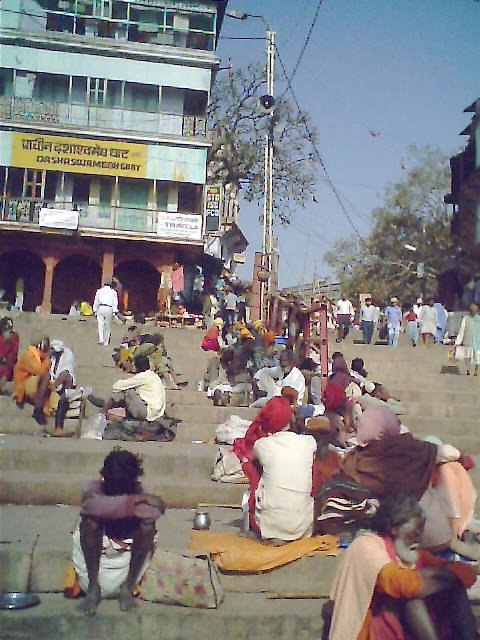
VARANASI: On the steps of a Ghat here showing one of the entrances to the
river front. There are only four or five along the several kilometer area of
the Ghats. Old bearded guys sit along the way with begging bowls... hungry
holy men, I guess.
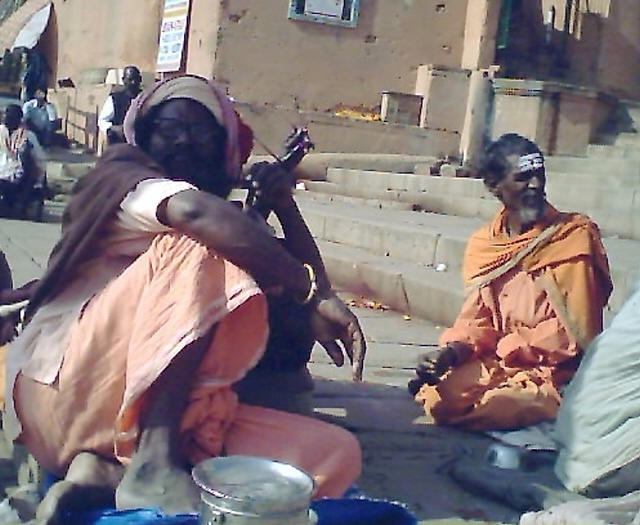
VARANASI: On the steps of a Ghat here showing some holy men taking a lunch
break.
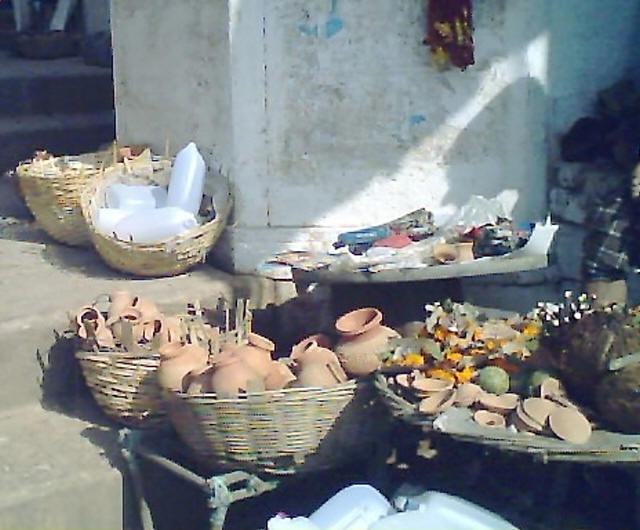
VARANASI: On the steps of a Ghat here showing a vendor's wares which
includes plastic bottles in which to carry home some of the Ganga River
water.
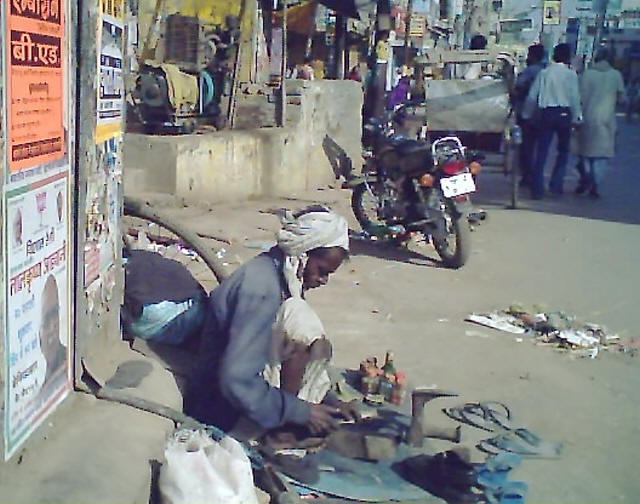
VARANASI: A street cobbler at work. I stood watching him for several minutes
without hm taking notice.
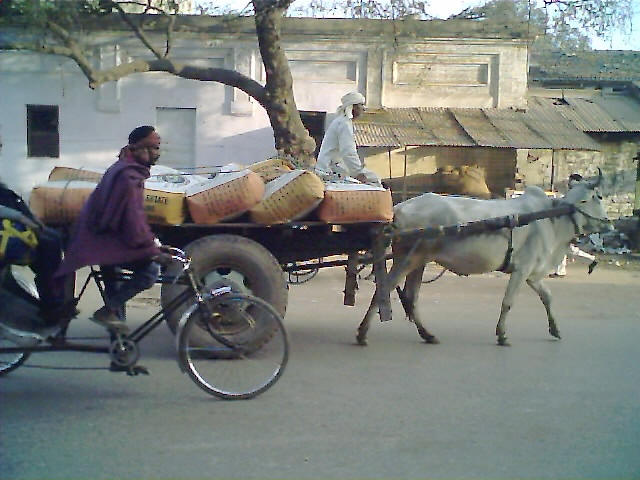
VARANASI: Cargo deliveries still are made the old fashioned way; by horse
drawn cart.
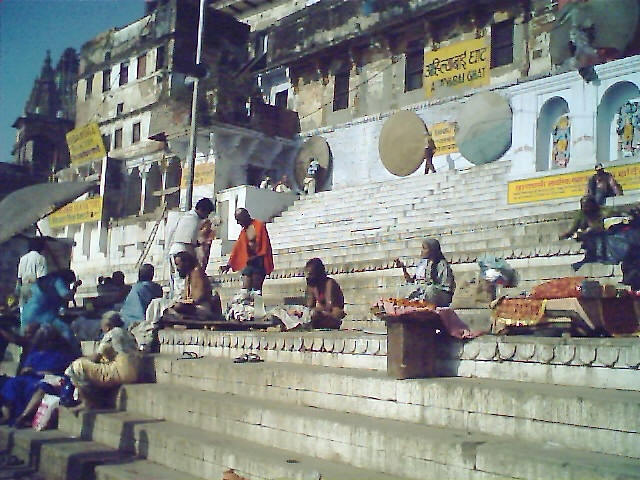
VARANASI: On the steps of a Ghat here showing holy men and others who seem
to be doing nothing, but watching.
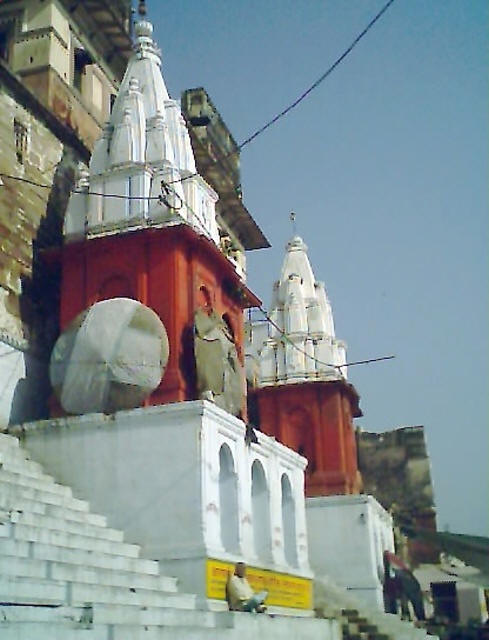
VARANASI: On the steps of a Ghat here showing one of the hundreds of temples
in and around the area of the Ghats.
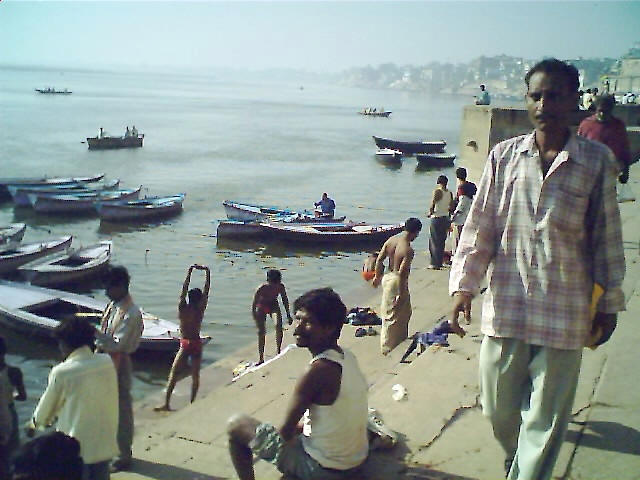
VARANASI: On the steps of a Ghat here showing a small group of boats waiting
for passengers. A half hour run up and down the river in the area of the
Ghats will cost about 50 Rupees... about a dollar. The fully dressed
guys presumably are either touts or boat operators.
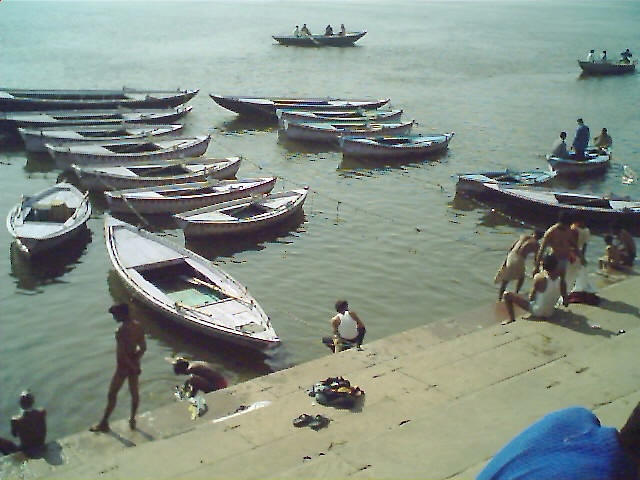
VARANASI: On the steps of a Ghat here showing a small group of boats waiting
for passengers. Some look more "sea worthy" than others.
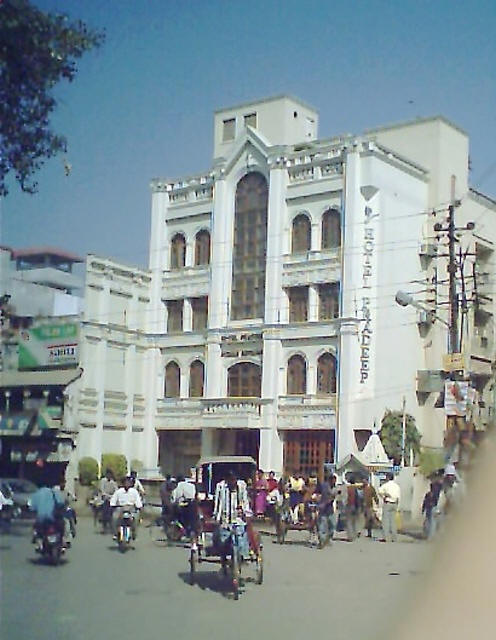
VARANASI: Exterior shot of the Pradeep Hotel ($25) where I spent two nights
after one night each in the $100 Radisson and the $75 Clark's Tower. The
Pradeep is an excellent value and much closer to the Ghats; not luxury, but
clean and well maintained.
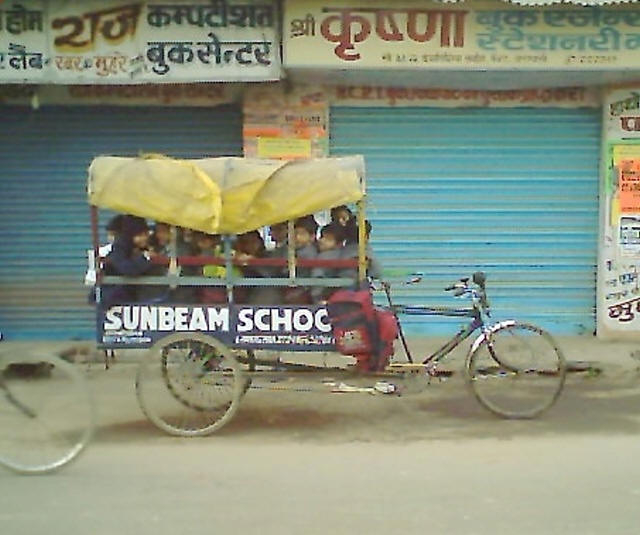
VARANASI: School kids in their rickshaw, peddle powered school "bus."
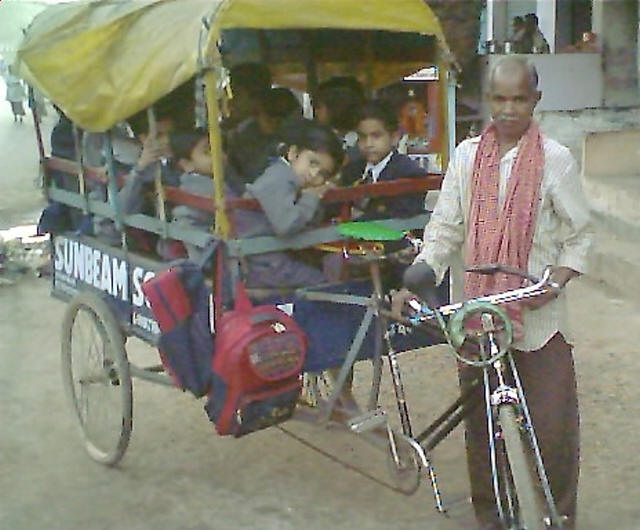
VARANASI: School kids in their rickshaw, peddle powered school "bus." The
grandfatherly diver tenderly helped each kid from his doorstep to the
waiting bus, packing them in like sardines.
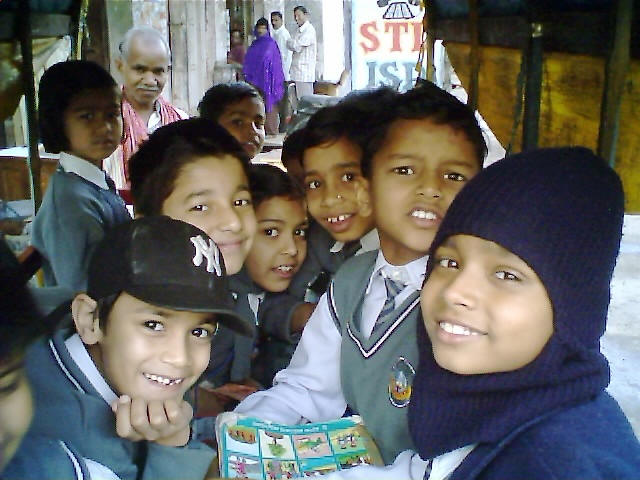
VARANASI: School kids in their rickshaw, peddle powered school "bus." They
got interested in me and my camera and eagerly posed with gusto for photos.
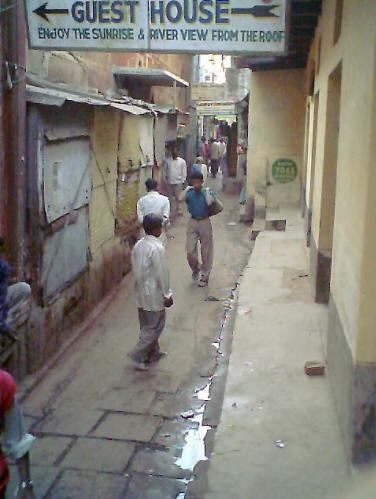
VARANASI: In the narrow, twisting alleyways
of the galis can be found most of the budget hotels favored by the
backpackers and young at heart... or just budget minded travelers.
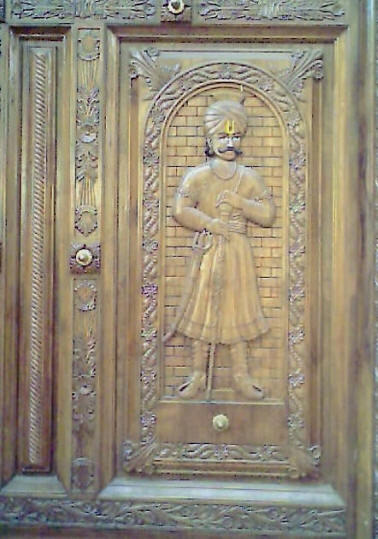
VARANASI: A beautifully carved door panel on the entrance to a Seik Temple.
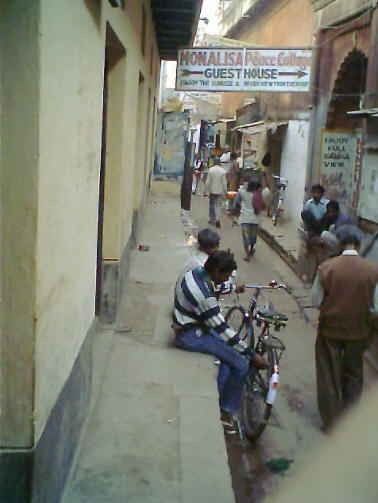
VARANASI: Another of the budget hotels
favored by budget minded travelers.
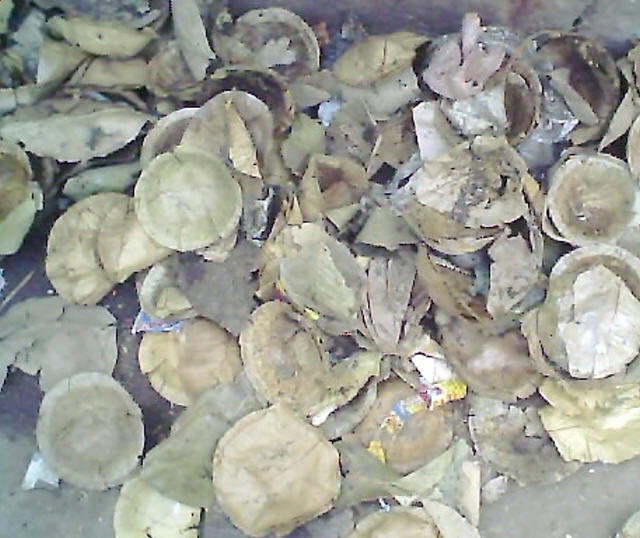
VARANASI: The ultimate biodegradable dish is
made from pressed and dried leaves. Here, a pile of used dishes already
disintegrating.
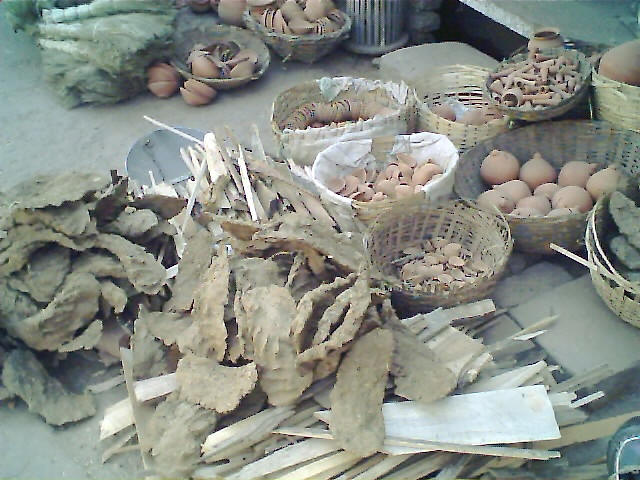
VARANASI: Stuff for sale on the street. The
irregularly shaped items to the left are dried cow dung "fire wood."
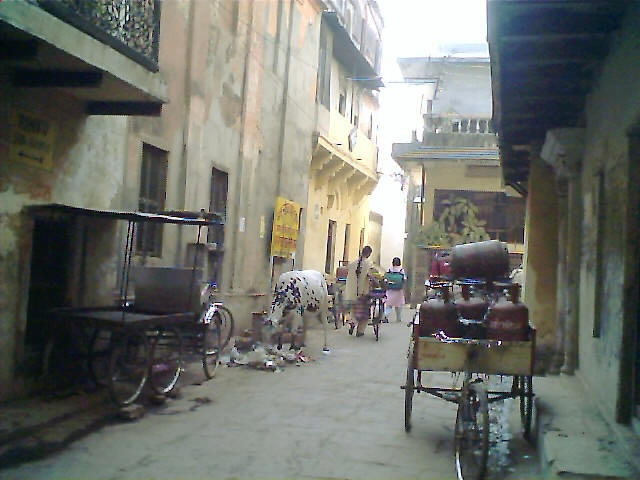
VARANASI: In the narrow, twisting alleyways cows, bicycles, rickshaws and
motorcycles compete for passage.
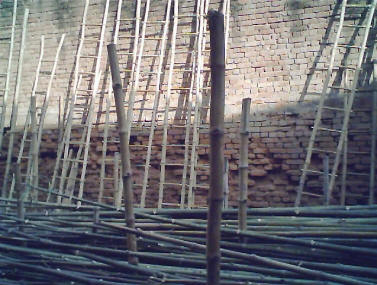
VARANASI: An Indian "lumber yard" or ladder
factory... not sure which.
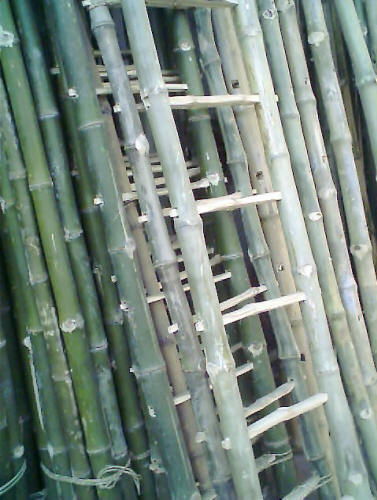
VARANASI: Part of the inventory in this Indian "lumber yard" or ladder
factory... not sure which.
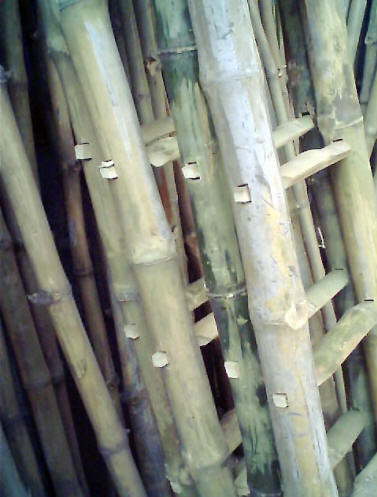
VARANASI: An Indian "lumber yard" or ladder factory... not sure which.
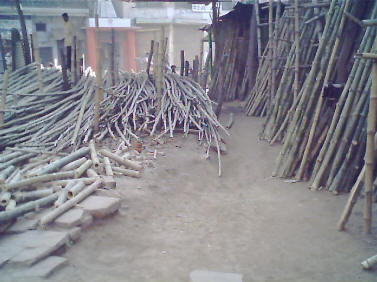
VARANASI: Part of the inventory in this
Indian "lumber yard" or ladder factory. It looks like builders have their
choice of bamboo or bamboo.
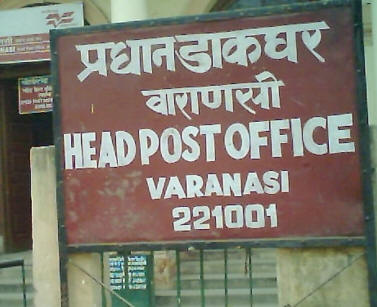
VARANASI: Main Post Office here. Nothing
fancy, but I guess they can deliver most of the mail.
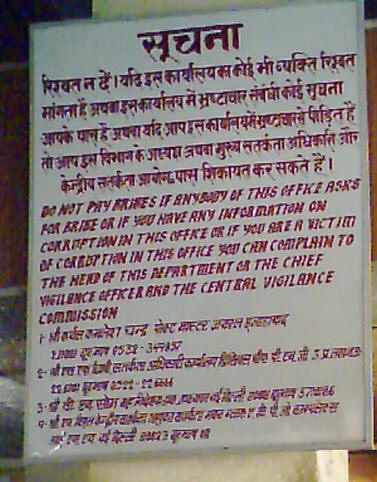
VARANASI: Main Post Office here. This sign in
three languages says not to give any employee a bribe and to report any
request for a bribe. One wonders what is behind the sign. Recent briberies?
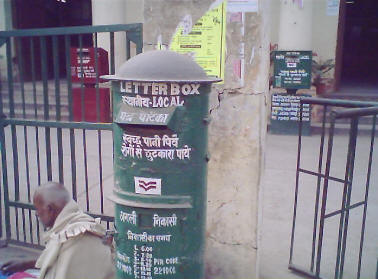
VARANASI: I saw a few of these Post Office
boxes around town. Nothing fancy, but I guess they do the job.
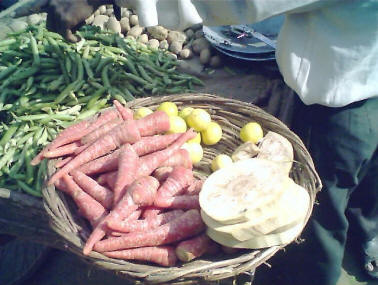
VARANASI: Those are not carrots, though they
look like carrots which have been painted red. They taste like a cross
between carrots and radishes.
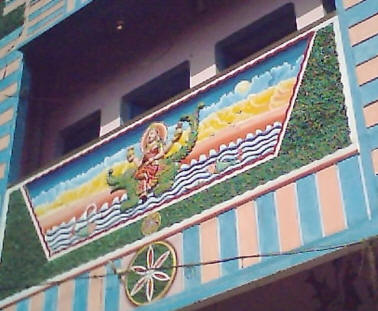
VARANASI: A friendly bystander said this is
an image of the Ganga River god. The fanciful creature seems to be a
combination of fish and elephant.
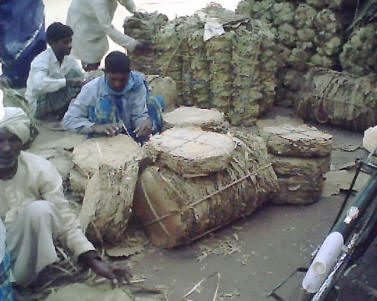
VARANASI: A wholesale tea distribution operation.
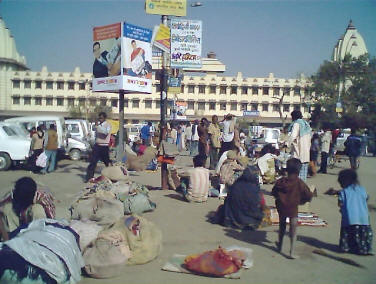
VARANASI: This is the main railroad station about a twenty minute walk from
my Hindustan International Hotel.
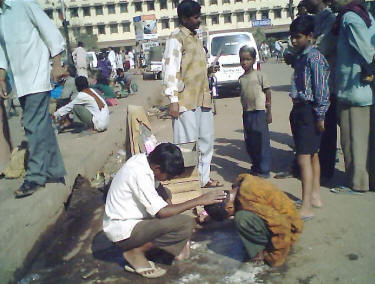
VARANASI: Here at the main railroad station a man washes a kid's hair,
occasionally plucking something from the suds... lice?
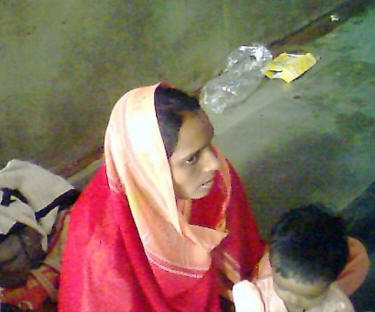
VARANASI: Here at the main railroad station a woman and her child wait for a
train.
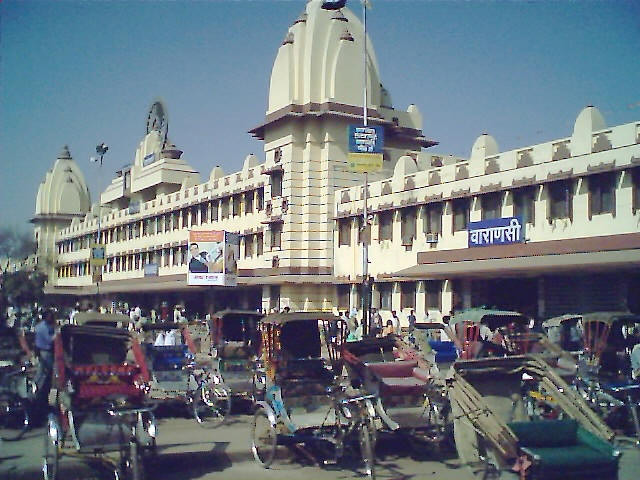
VARANASI: A fleet of rickshaws wait for passengers here at the main railroad
station.
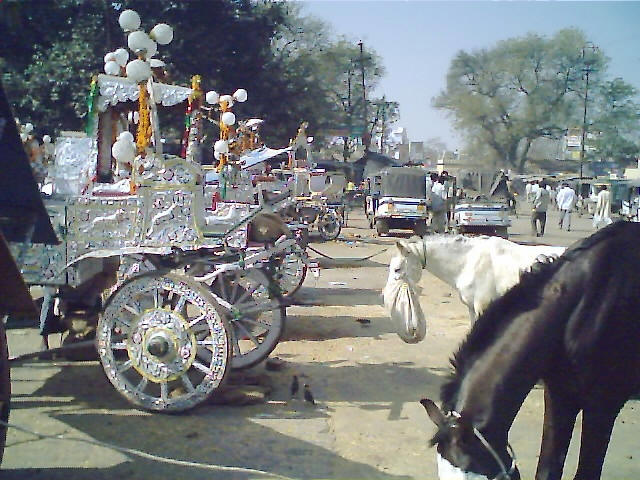
VARANASI: At the Kashi Railroad Station I spotted about ten fancy carts like
these, presumably used in a recent parade.
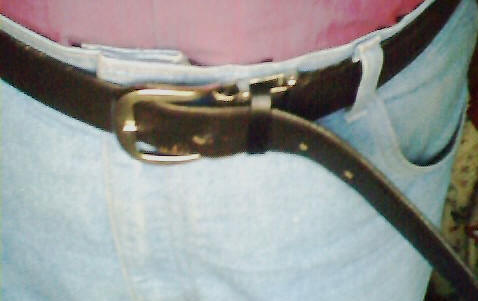
VARANASI: I started the trip using the second hole in the belt. Three months
later I'm up to the fifth hole! That's a reduction of about four inches in
girth. Some of it might be from sucking in my gut from all the walking, but
at least part reflects a healthy loss of body weight.
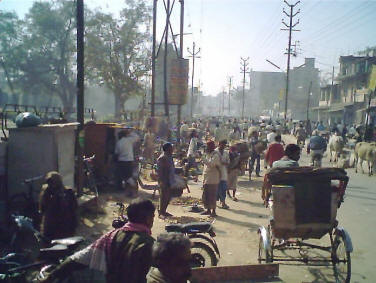
VARANASI: Street market scenes near the hotel one morning during rush hour.
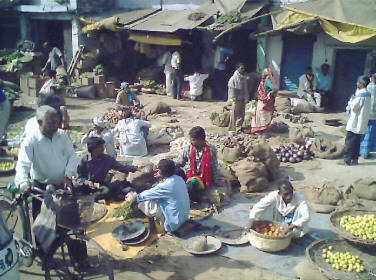
VARANASI: Another view of the street market scene near the hotel one morning
during rush hour.
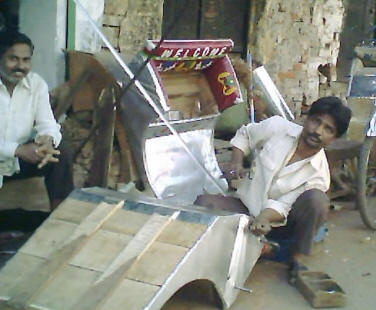
VARANASI: Rickshaw manufacturing shop.
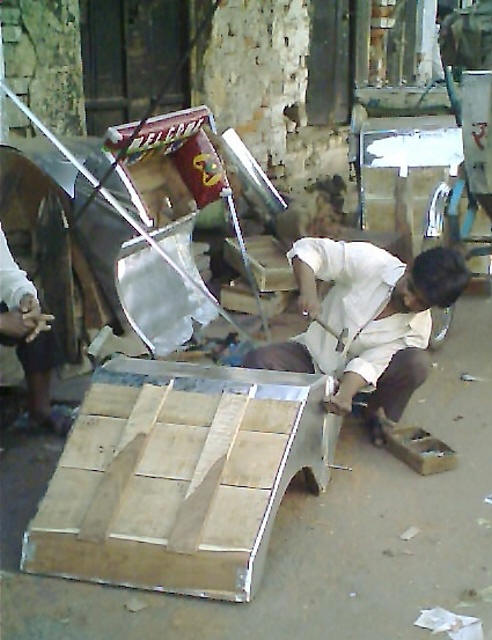
VARANASI: Rickshaw manufacturing shop.
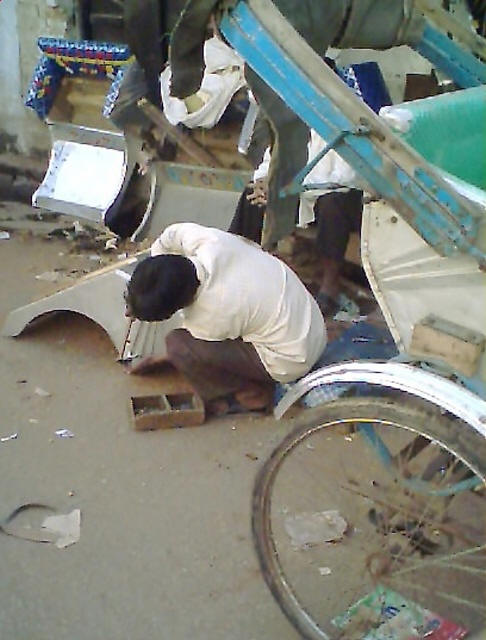
VARANASI: Rickshaw manufacturing shop.
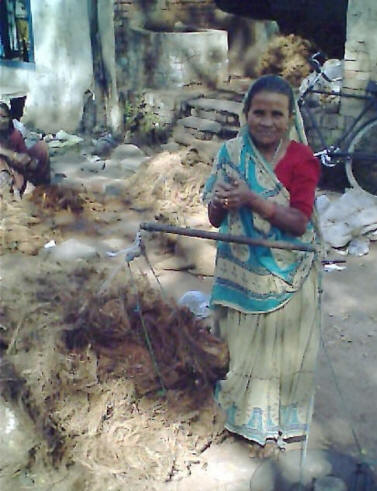
VARANASI: One of the women processing coconut husks for rope. She is
weighing her production.
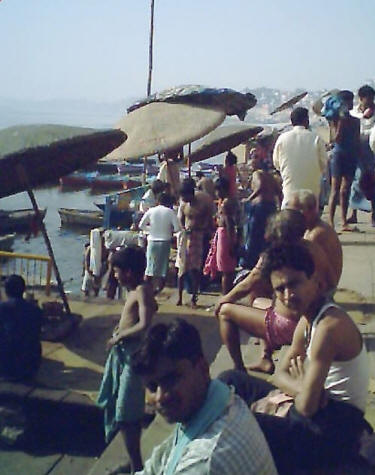
VARANASI: On the steps of a Ghat Typical scene along the several kilometers
waterfront. Notice the people watching me.
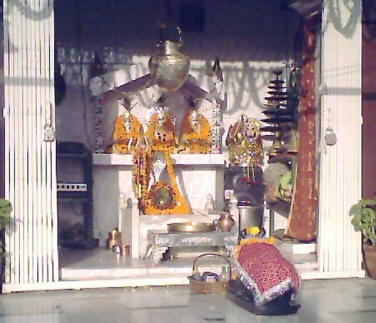
VARANASI: One of the hundreds of small "temples" located around the City of
Lights.
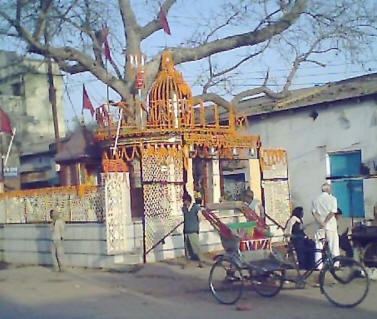
VARANASI: One of the hundreds of small "temples" located around the City of
Lights.
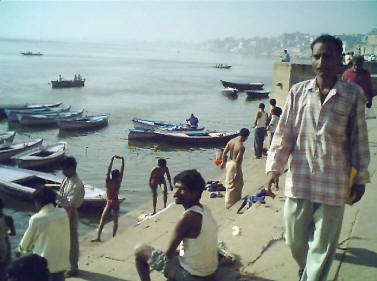
VARANASI: On the steps of a Ghat here showing a small group of boats waiting
for passengers. A half hour run up and down the river in the area of the
Ghats will cost about 50 Rupees... about a dollar.
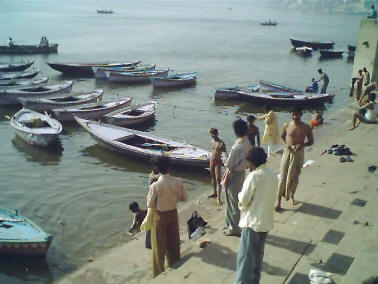
VARANASI: On the steps of a Ghat here showing a small group of boats waiting
for passengers. The fully dressed guys presumably are either touts or boat
operators.
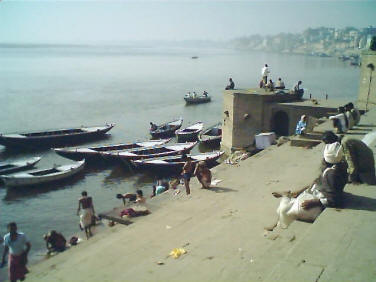
VARANASI: On the steps of a Ghat lined by boats waiting for the tourists.
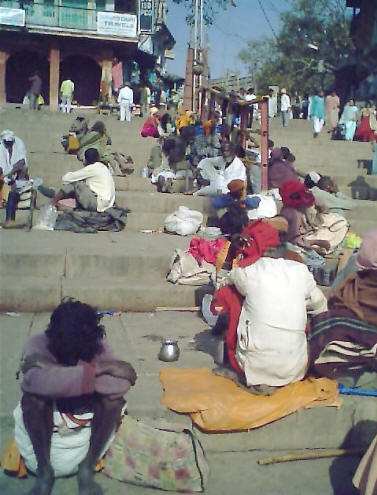
VARANASI: On the steps of a Ghat here showing one of the entrances to the
river front. There are only four or five along the several kilometer area of
the Ghats.
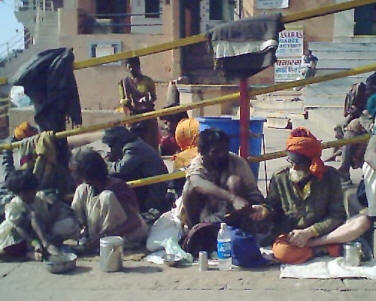
VARANASI: On the steps of a Ghat here showing either a bunch of beggars or
holy men. It is hard to tell some of them apart as both beg.
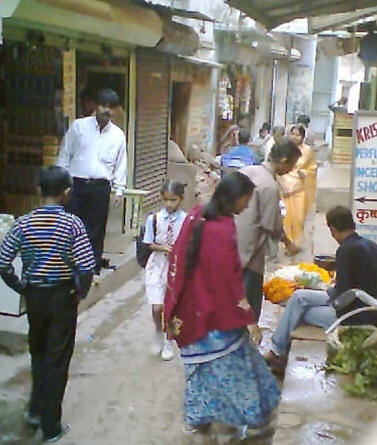
VARANASI: A typical scene along the narrow alleyways near the Ghats.
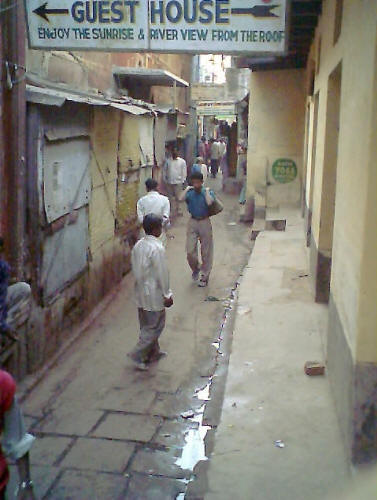
VARANASI: In the narrow, twisting alleyways known as galis can be found most
of the budget hotels favored by the backpackers and young at heart... or
just budget minded travelers.
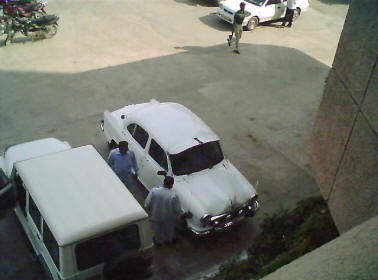
VARANASI: View from my room #102 in the Hotel Hindustan International.
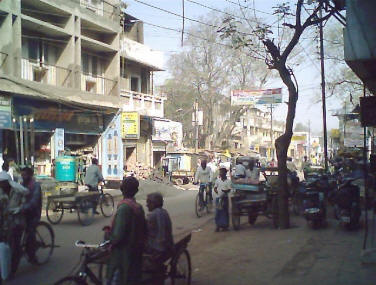
VARANASI: Panorama right to left of the area around the cyber cafe I used
near the Hindustan Hotel.
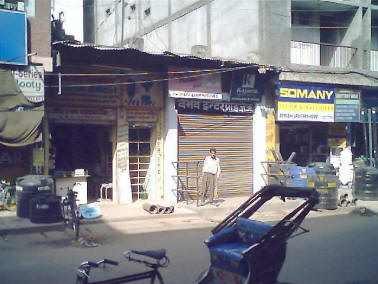
VARANASI: Panorama right to left of the area around the cyber cafe I used
near the Hindustan Hotel.
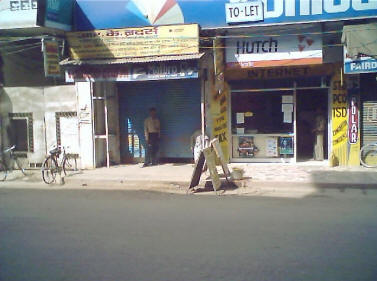
VARANASI: Panorama right to left of the area around the cyber cafe I used
near the Hindustan Hotel. |
  18 February
- 1 March 2004 18 February
- 1 March 2004
Hello from the Ghats of Varanasi,
Gee gads. What's a
Ghat? I kept hearing about the bathing Ghats and the burning Ghats of
Varanasi weeks before deciding to visit the city. I knew they had something
to do with the funeral pyres shown in travelogues and devotional dunkings in
the holy River Ganges. When I finally got there I did see a lot of bathing
and some cremation fires along the river, though no bereft widows throwing
themselves on the pyres, an ancient custom now rare, though others which
mistreat and exploit
widows do continue. Smoke around the area of the burning Ghats carried
a peculiar, though not totally unpleasant smell. Mingled with the other
olfactory treasures from burning cow dung, bulk displays of powdered curry
and other spices, the ever present smoldering incense sticks offered to the
denizens of the area favored by the young backpackers, and frequent wafts of
urine freshly splashed on the walls of narrow streets, all masked the unique
smell of the burning flesh on funeral pyres. Such rituals have been
occurring for thousands of years here. Varanasi may
be the oldest living city in the world.
Death chants of mourners, the sing-song sounds of Hindu priests, taxi tout
assaults, honking horns and tinkling rickshaw tricycle bells, individuals
unselfconsciously singing as they work, agitated merchants hawking their
wares, clusters of friends chatting at the top of their voices all conspired
to create a constant aural ambiance unique to Varanasi. There is almost no
western music played anywhere in the city; even the hotels favor soft
traditional Indian music for dining. Some locals still refer to the city as Banaras
as do older maps.
My train from Agra stopped at the Mugulserai station 18 kilometers from the
city proper. The usual mob of taxi touts and drivers waited for stranded
passengers from the train platform to the chaotic street. All had horror
stories to tell of those unwise enough to refuse their transport services.
Eventually, I and three others with whom I'd shared the train negotiated a
200 Rupee ride to the Radisson Hotel. As we arrived after dark I opted to
stay in the $100 Radisson that first night. Later, I discovered we were in
an area far from the "main" Ghat. Many of the expensive up scale hotels are
here in this quiet and unexciting area, not far from the principle railroad
station. As is my practice I went hotel shopping the next morning and found
the luxury Clark Tower Hotel not more than 50 meters away at $75. With more
shopping the Hotel Pradeep at $25 became my abode for three nights before
stumbling on the deluxe Hindustan International at $45. It is not far from
the main street and much closer to the river and the Ghats.
One morning at 05:00 in the Pradeep Hotel a loud commotion not far from the
hotel escalated into near pandemonium as a funeral procession worked its way
down the street below my window. Fully awake I watched as the mourners
slowly shuffled by our hotel to the accompaniment of amplified Hindu
chanting and cymbals. Several people carried the body covered with flowers
on a "stretcher" above their heads. The ritual continued for a half hour,
making this an early rising morning for me.
Bitter experience has taught me to mistrust the Indian Government Tourism
Offices; their maps and descriptive brochures are fine, but accommodation
advice is always misleading. With a little hotel shopping I always find much
better values than is ever suggested by the people in those "official"
offices. They claim to be looking out for visitors, but in fact seem to be
driving traffic to lodges which cannot successfully compete on their own
merit.
Food sellers on the street serve food in bowls made from pressed leaves, the
ultimate in biodegradable containers. Piles of these discarded dishes
awaited collection or trampling along with disposable clay cups in which
street tea is served.
My Phillips KEY007 camera continues to attract unabashed curiosity here.
Every time I pull the little guy out, groups of people will approach me with
questions or inquisitive stares. Often, my stolen pictures show sour, angry
faces. Nothing could be further from the reality. The intensity is
fascination, admiration, approval and soon after I've gotten my picture the
scowls turn to wide smiles.
Every upscale hotel in Varanasi has a flock of rickshaws hovering around the
entrance, ready to pounce on guests every time they venture out. Here in
Varanasi locals pay 5-10 Rupees for most rides anywhere in the city. Foreign
visitors are always asked to pay 20-60 Rupees. Eventually I learned to walk
away from inflated fare quotations. On every occasion the driver rushed to
catch up with my brisk pace and countered with his own "How much?" Out would
come my ready ten Rupee note which eventually would be accepted for the
ride. A second ruse commonly practiced by drivers starts with an offer of
sight seeing for ten Rupees an hour or a single ride to the river for that
fare. Later in the trip the driver wants to take you to a special
"government shopping bazaar" or suddenly notes your destination is far and
you must pay 50 Rupees! To complicate matters, drivers never speak good
English and many are illiterate... or pretend to be.
The river is lined with buildings, some newer, most old and all blocking
access to the river and the Ghats, save for three or four public alleys
which wind their way from the tangle of narrow streets and alleys called
galis of Old Varanasi to the top of the stairs leading down to the river.
This is a
Ghat. Young backpackers flock to the invariably cheap guest houses and
cafes situated in the area. One sign caught my attention: "APSARA
Restaurant: Yes, we are less dirty..."
Through the narrow streets of Old Varanasi rickshaws, wildly maneuvering
bicycles, loud motorcycles, pushing pedestrians, languishing shop owners and
the ubiquitous herds of cows crowd the way, sometimes making progress
impossible. Several of the cows wandering the streets had seriously injured
hooves; one so badly it dangled from the end of its leg. "Watch where you
step." advised one experienced visitor. Good advice, as a fresh pile of cow
plops is never more than a nose throw away. Near my hotel one hapless lady
struggled to wipe a mess off her soiled shoe, making little progress.
"Better use a stick or take it back into the hotel and hold it under the
shower" I advised. "Well I would but my bus leaves in five minutes" she
whimpered. Glad I missed that particular bus.
The burning Ghats might more appropriately be called the laundry Ghats. For
ever funeral pyre I saw a hundred guest-house laundry people beating the
devil out of travel garments left in their safe keeping by trusting guests.
Washed clothes ended up spread out for drying on the unused cremation
platforms and on the stairs of the Ghats. In one place the array of drying
clothes blocked easy passage from one side of the Ghat to the other. Below a
recently concluded cremation several enterprising men were sifting through
the sand where the deceased ashes had been dumped. I presume they were
"panning" for gold, having established the remains came from a well-to-do
"dearly departed."
People brush their teeth on the street using the smashed end of a stick,
something I first saw in Africa. Toothbrush sellers with piles of sticks
made from one particular wood favored by users can be found along the
streets.
Internet access quality and costs vary a lot: from a low of 15 Rupees per
hour up to 50 Rupees (35 cents to $1.10/ hr). Frequent power outages make a
UPS essential and not all cyber cafes have them. I got caught twice with
significant creative writing flushed into the either by a suddenly dead
computer. Here in India matrimonial websites are popular. Both young men and
women worked at finding mates on the net. Most marriages still are arranged
by the families with the help of "brokers" I learned from the front office
manager in the Hindustan International Hotel. Chandra told me how his
arranged marriage, scheduled for this month had to be postponed for a year
when his fiancÚ's father unexpectedly died a few months ago. Hindu custom
requires the bereaved to abstain for a year from most forms of celebration,
including a wedding.
On the streets of downtown Varanasi traffic is bumper to bumper, literally.
Every rickshaw driver is constantly bumping the axle ahead of him and in
turn being bumped by the guy behind him. Muted angry words between drivers
are common, though I never saw any of them escalate into something serious.
Sunday, most stores are closed and traffic is much lighter. By mid-day the
air is nearly unbreathable with airborne dust and exhaust fumes. Shop owners
are constantly sweeping new clouds into the air as they engage in futile
efforts to keep the areas in front of their stores clean. So bad is the air
pollution I finally got wise and bought a dust mask to wear most of the time
on the streets. Clogged open sewers can be seen all over town. To their
credit, store owners try to keep them cleaned out but the efforts are soon
defeated by the constant stream of new rubbish flowing in the water. I've
now come to realize that filth is relative and that there are different
categories of filth. Some assault the senses; some threaten our health; some
merely irritate our cultural sensibilities.
Milk distribution is handled on the streets at various locations established
by custom. I watched transactions between dairymen and buyers for a while,
snapping a few pictures. Like any prudent shopper, buyers wanted a sample of
the merchandise before making their purchase. Off came the top of the ten
gallon size stainless steel can and in went the buyer's cupped hand for a
sample. If the buyer approved, the seller poured a quantity into the buyer's
can. Other potential buyers came and went repeating the procedure, leading
me to wonder if everyone washed their hands before going out to buy milk.
A wonderful on-line book by Chris Baxter includes a chapter on Varanasi.
Take a look at his
book.
That's it for now.
Peace,
Fred L Bellomy
PPS: For anyone following my wanderings it will become apparent there often
is a significant delay in getting out the postcards. At the moment I am in
Bangkok and leaving for Hong Kong tomorrow morning. FB
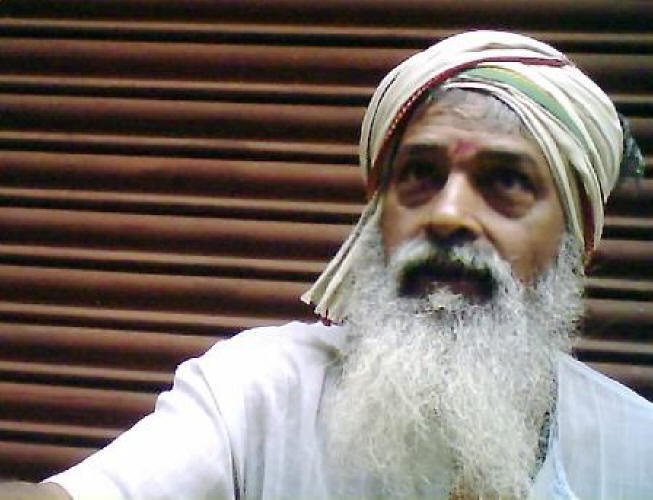
VARANASI: Along the narrow galis near the
Ghats I came upon this beautiful man who wanted to see my camera.
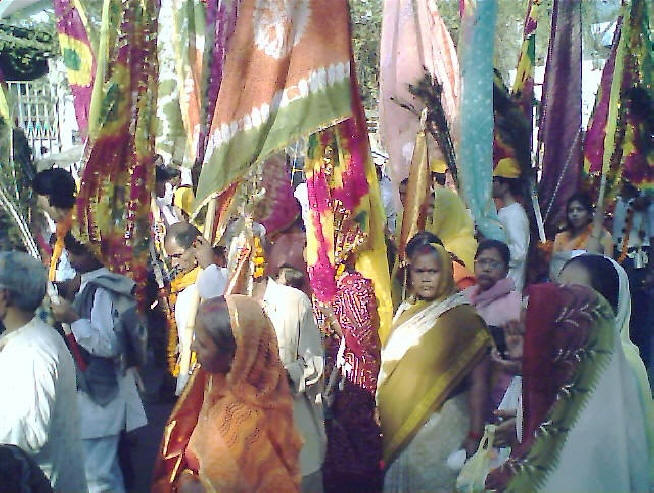
VARANASI: 27 February a noisy parade slowly
passed our hotel. On the street I saw this scene and noticed a cargo cart
containing several "5 gallon" stainless steel pots. Helpers were ladling a
mixture of milk and honey into plastic glasses which were greedily consumed
by an endless line of takers. One of the rickshaw drivers said people were
celebrating the arrival of a "holy baba," or holy old man.
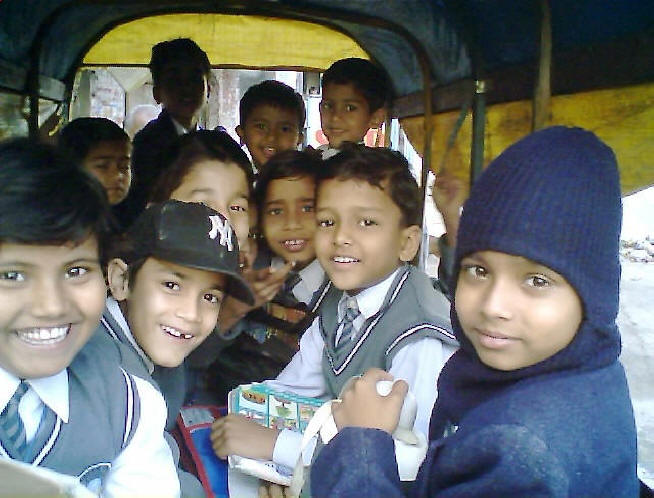
VARANASI: School kids in their
rickshaw, peddle powered school "bus." They seemed to be enjoying me
as much as I delighted in them.
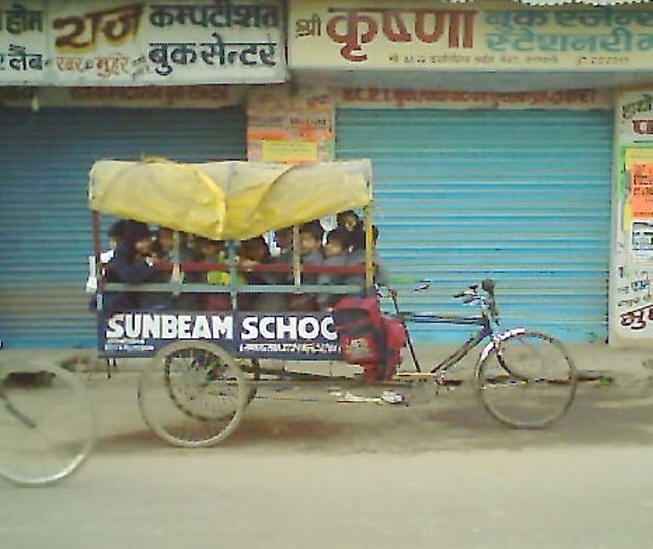
VARANASI: School kids in their rickshaw, peddle powered school
"bus."
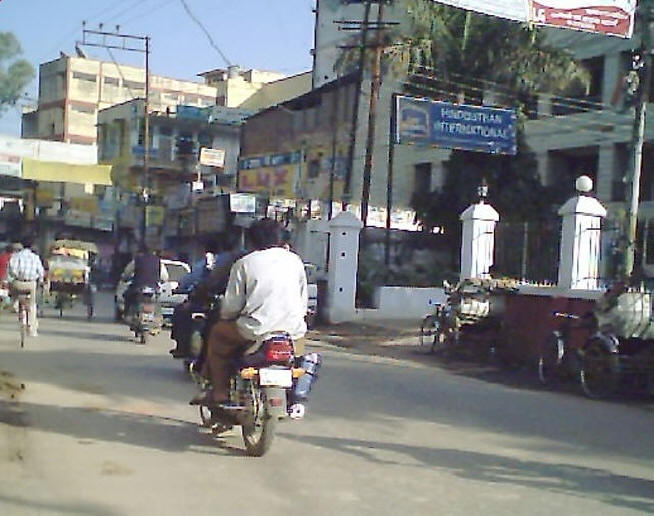
VARANASI: Entry driveway into the Deluxe Best Western Hindustan
International Hotel ($40) where I stayed for the last part of my time in
Varanasi. It is a bubble of luxury in a typically cluttered and filthy
area... actually, there are no areas here that could be described as clean
and well maintained.
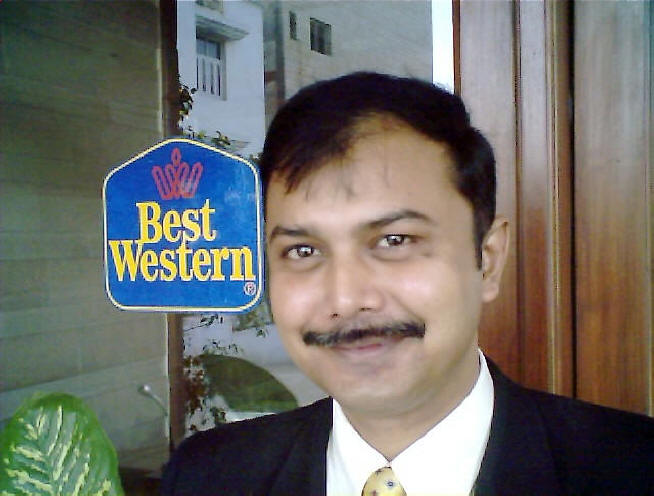
VARANASI:Meet Mr. Supradeep Chandra, sales manager of the Best Western Hotel
Hindustan International in Varanasi. After checking many hotels I concluded
the Hindustan is by far the best value for singles. At $40-44 and luxury
facilities, it is hard to beat. As far as I can tell it is the closest house
to the principle tourist attractions, the Ghats.
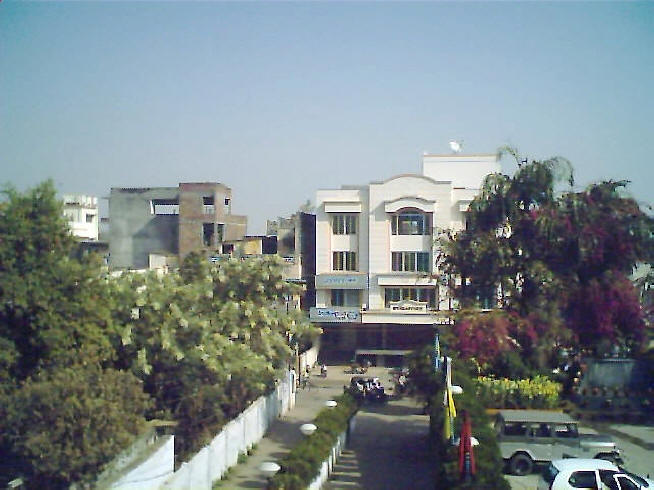
VARANASI: View from my room #102 in the Hotel
Hindustan International.
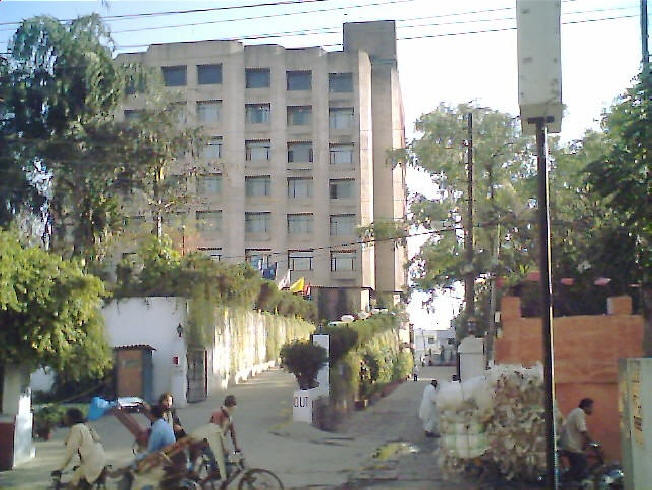
VARANASI: Exit driveway from the Deluxe Best Western Hindustan International
Hotel where I stayed for the last part of my time in Varanasi.
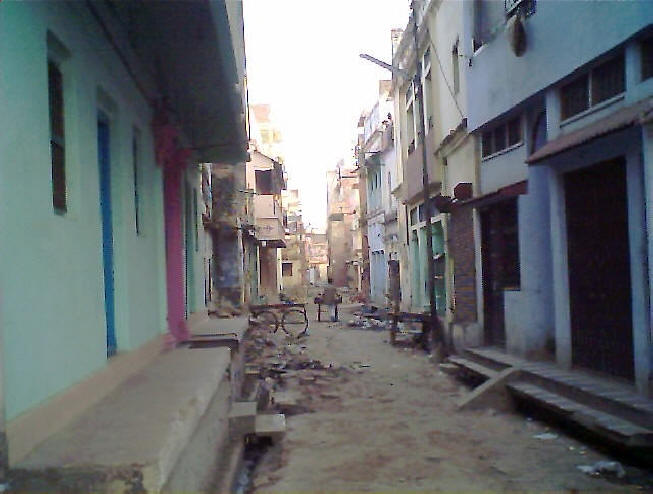
VARANASI: Looking down a typical side street near the Hindustan
International Hotel.
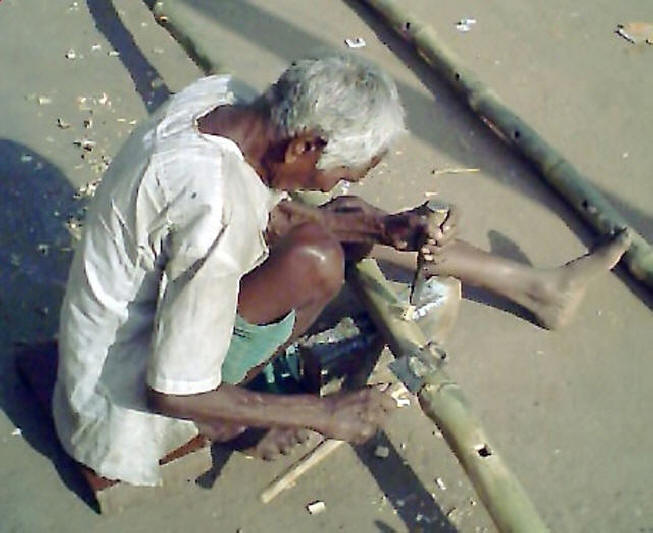
VARANASI: I paused to check out an
Indian "lumber yard" or ladder factory... not sure which. This guy
is manufacturing ladders, however. That is certain.
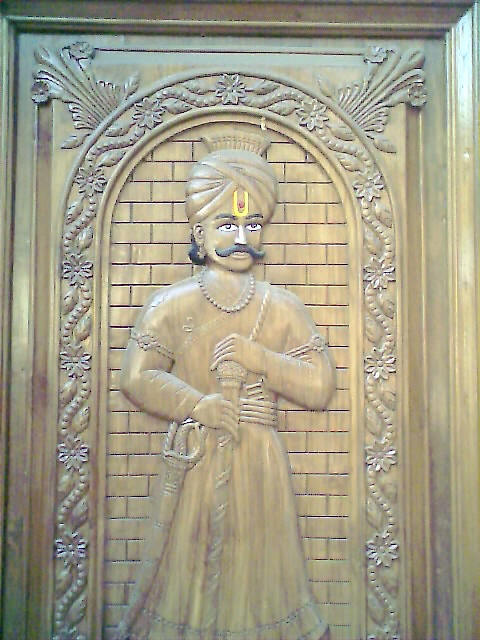
VARANASI: A beautifully carved door
panel on the entrance to a Seik Temple.
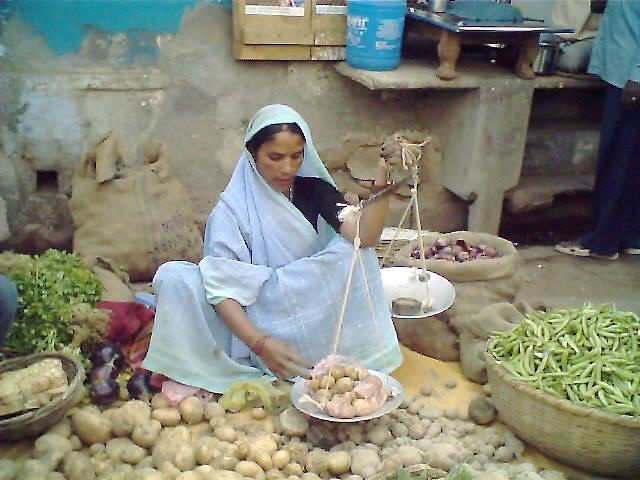
VARANASI: Lady weighing out a portion
of potatoes for a customer.
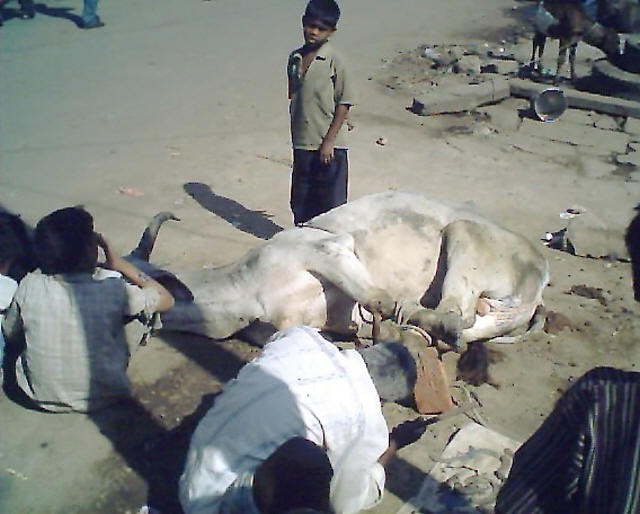
VARANASI: Blacksmiths still have work
in India. Here one is replacing iron shoes on a "holy" cow.
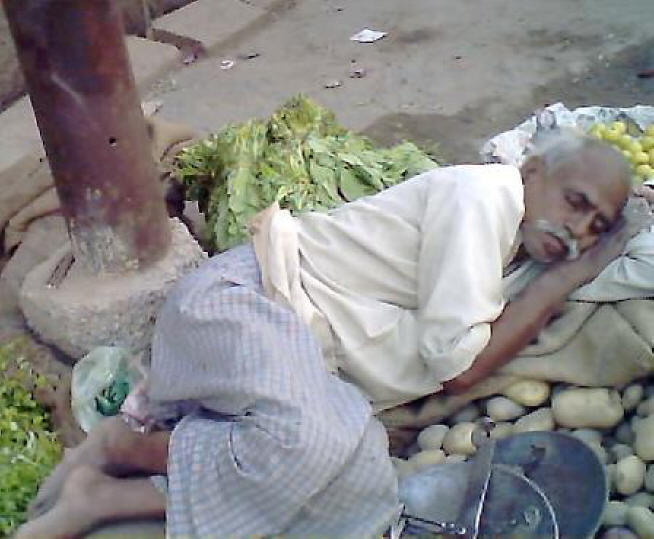
VARANASI: Taking a nap between sales.
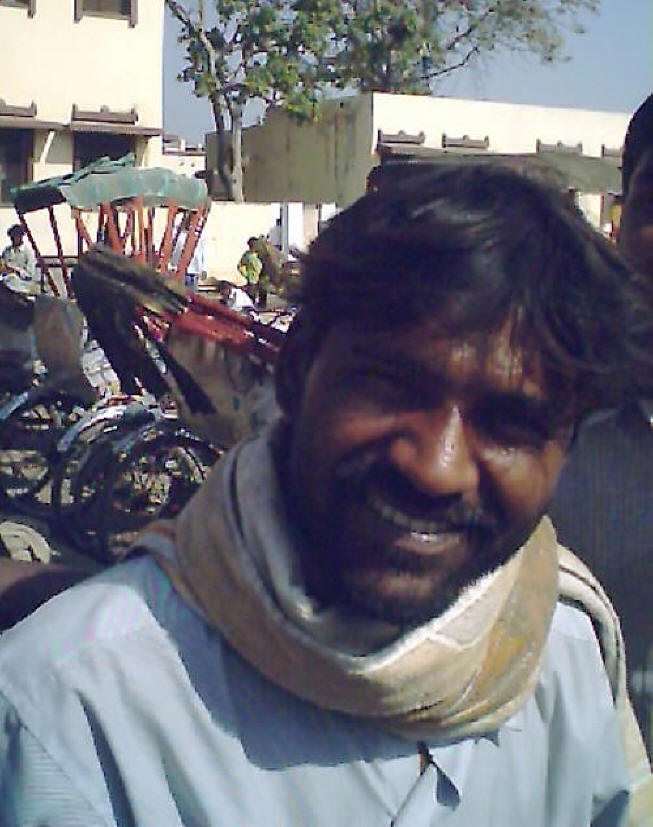
VARANASI: One of my many rickshaw drivers.
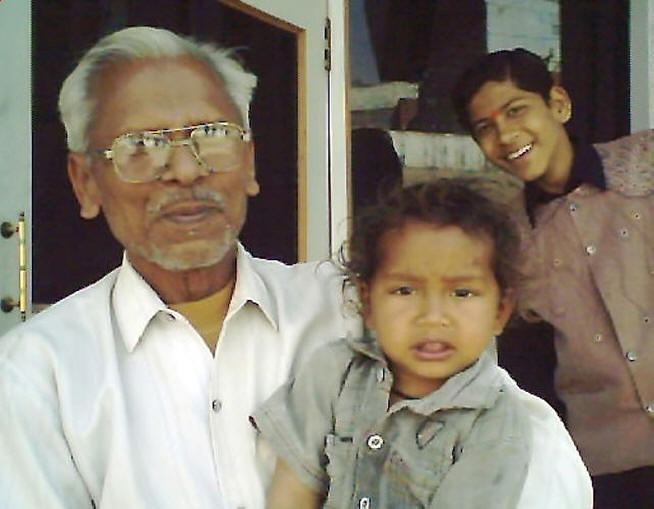
VARANASI: Cute baby and proud grandfather... an older brother in the
background?
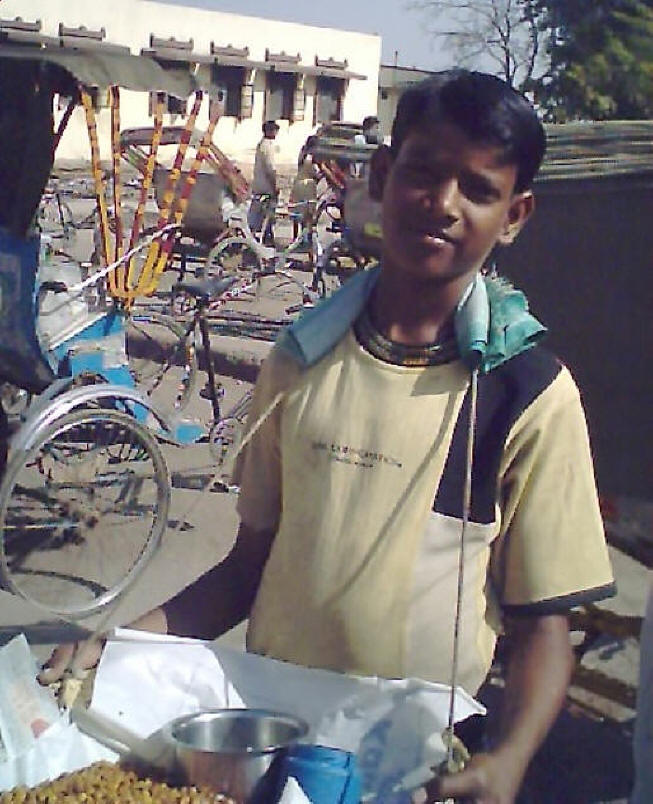
VARANASI: While waiting at the main railroad station this boy exhibited
interest in my camera so I did the "CAMERA, COMPUTER, INTERNET" routine for
him. A bystander translated for us. A very bright boy who could not afford
to be in school. He must work for food! So, I bought five orders of his nuts
and instructed him to give them to other bystanders... not a handout...
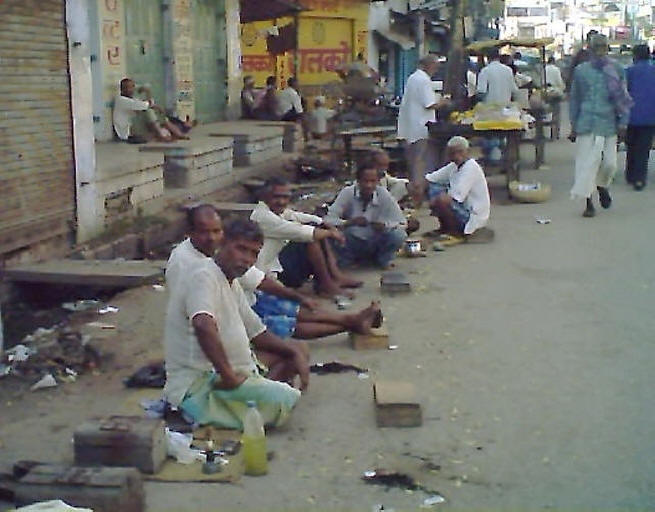
VARANASI: A five "chair" barbershop... Indian style. "You're next!"
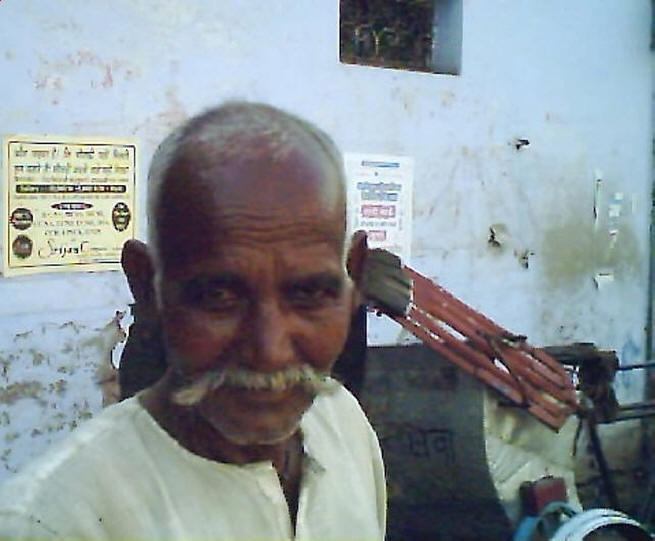
VARANASI: One of the barbers noticing my long hair at the five "chair"
barbershop gestured indicating I could use a haircut... the nerve.
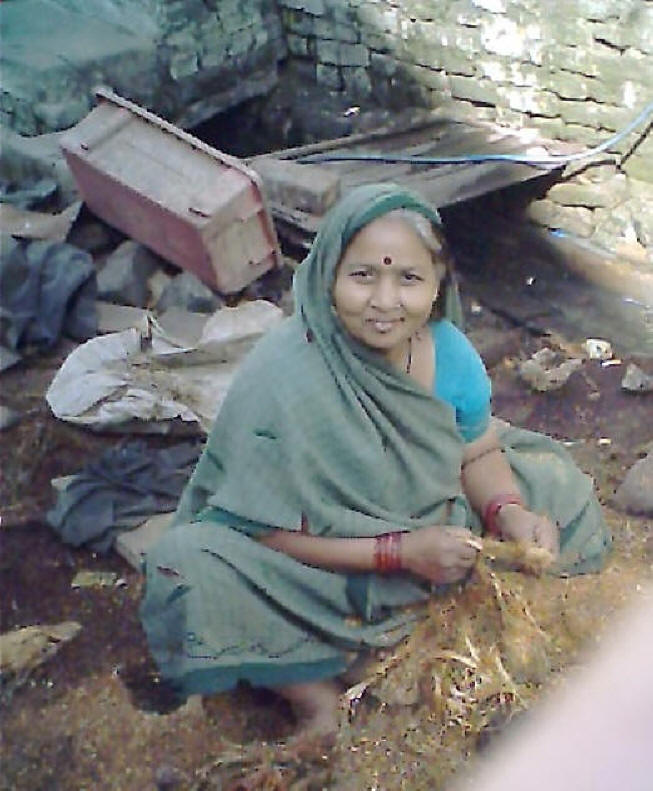
VARANASI: One of the women processing coconut husks for rope. She motioned
for me to take her picture.
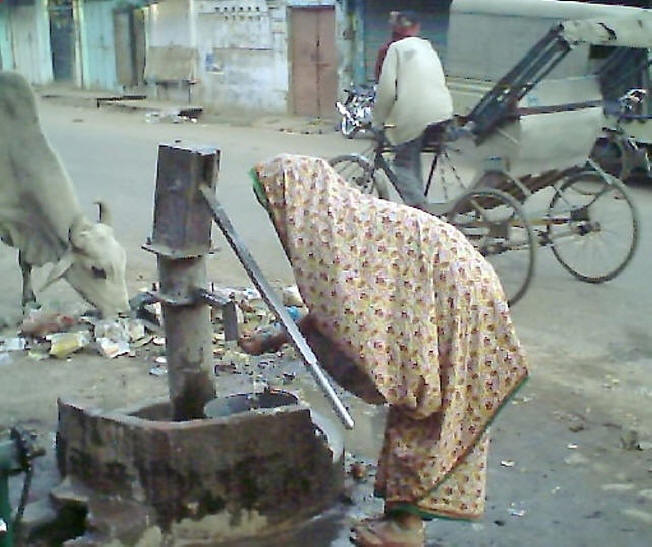
VARANASI: Lady at the neighborhood water pump.
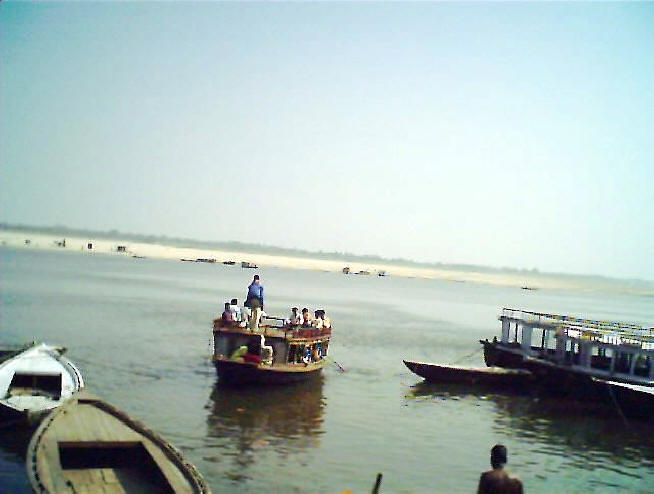
VARANASI: A typical scene along the banks of the Ganga River in the
area of the Ghats, stone stairs leading down into the river.
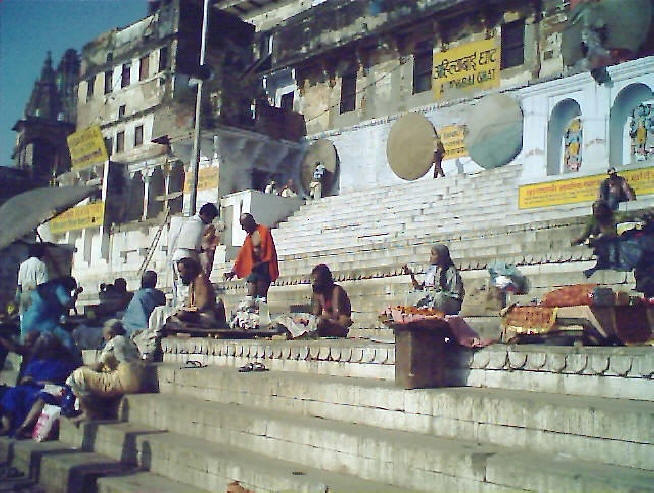
VARANASI: On the steps of a Ghat here showing holy men and others
who seem to be doing nothing, but watching.
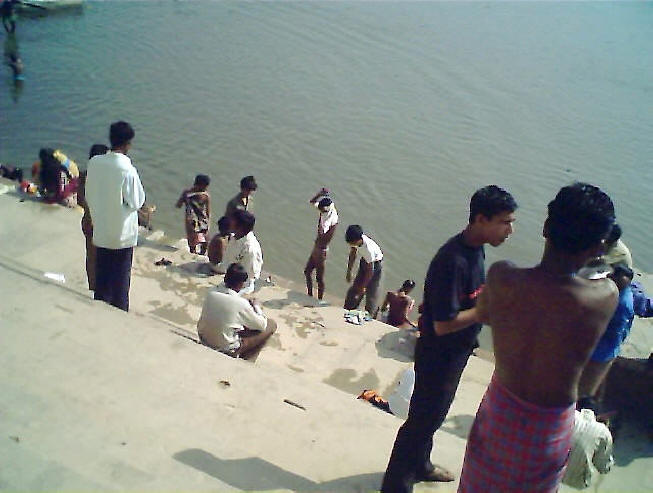
VARANASI: A typical scene along the banks of the Ganga River in the
area of the Ghats, stone stairs leading down into the river.
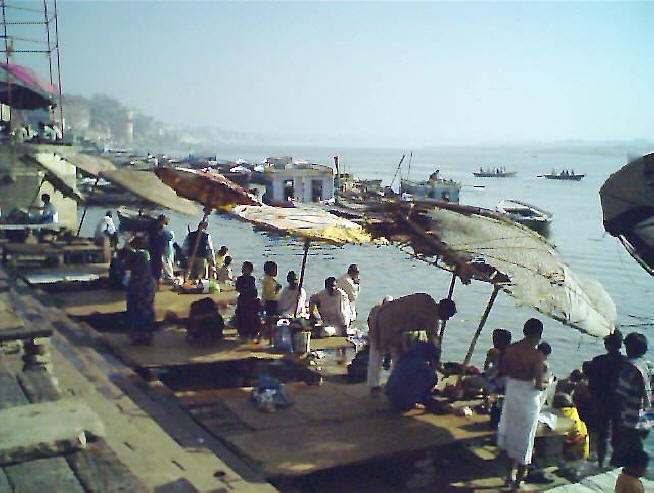
VARANASI: At the "main" Ghat "holy men" sit waiting for clients
wanting to be blessed.
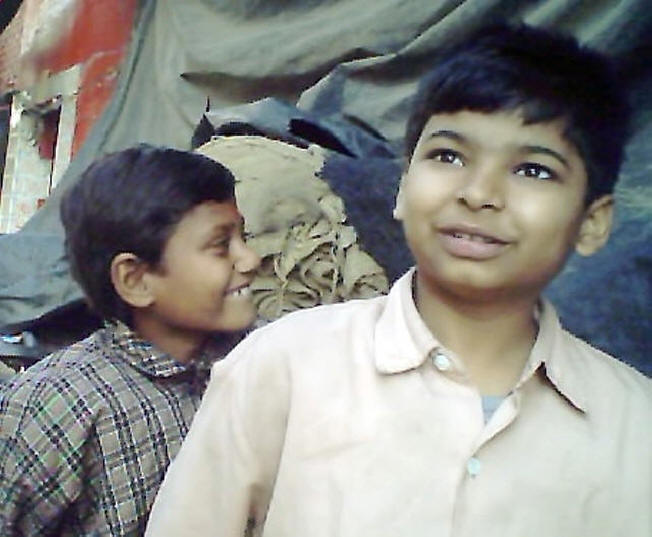
VARANASI: Another couple boys in a group who became fascinated with
my camera.
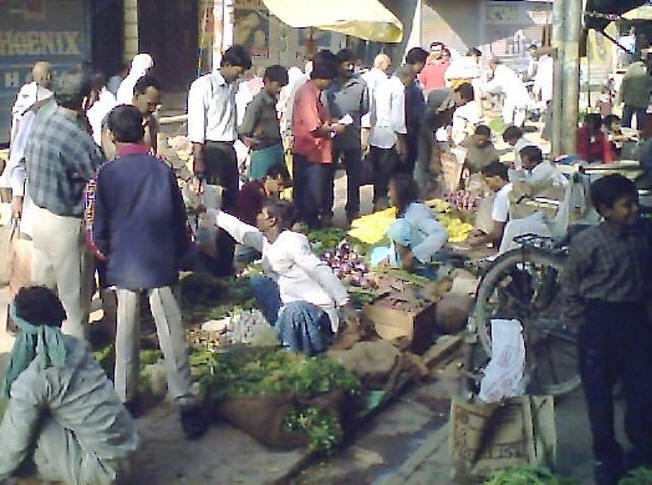
VARANASI: Street vendors haggling with customers.
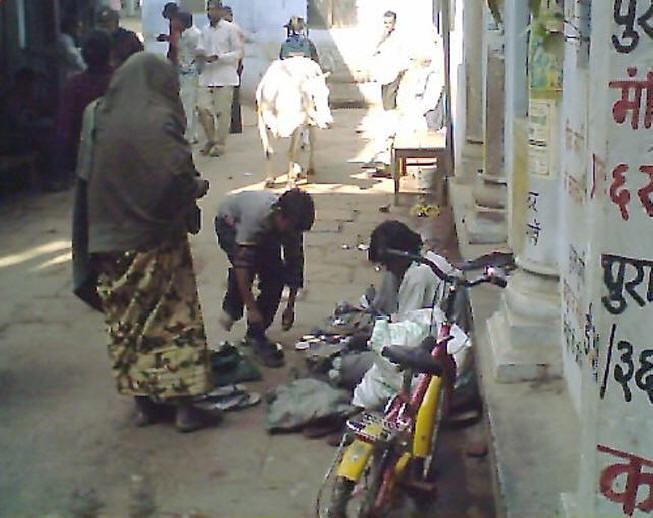
VARANASI: In the galis; a typical scene.
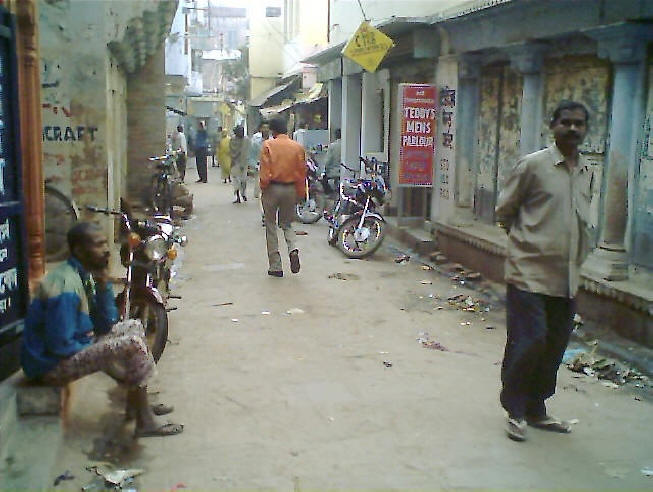
VARANASI: In the galis alleyways; a typical scene.
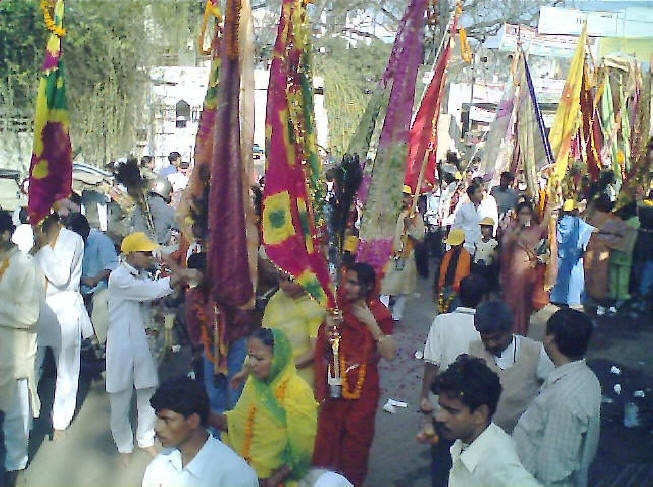
VARANASI: 27 February a noisy parade slowly passed our hotel. On the
street I saw this scene and noticed a cargo cart containing several
"5 gallon" stainless steel pots. Helpers were ladling a mixture of
milk and honey into plastic glasses which were greedily consumed by
an endless line of takers. One of the rickshaw drivers said people
were celebrating the arrival of a "holy baba," or holy old man.
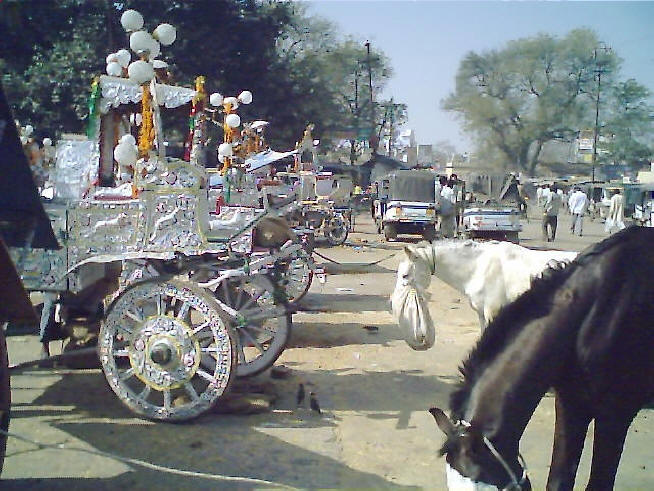
VARANASI: At the Kashi Railroad Station I spotted about ten fancy
carts like these, presumably used in a recent parade.
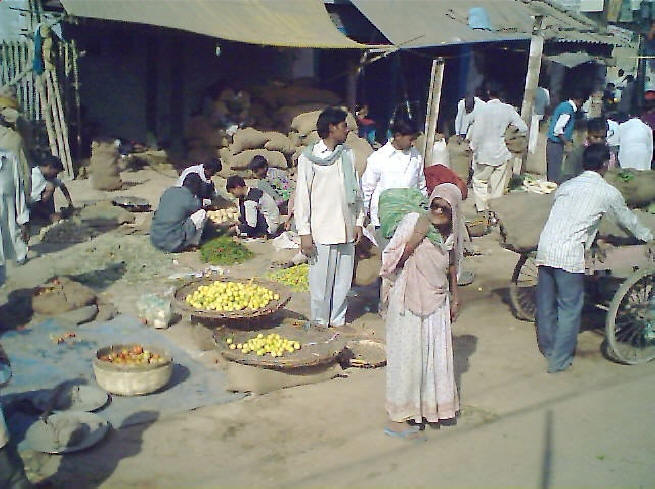
VARANASI: Street market scenes near the hotel one morning during
rush hour.
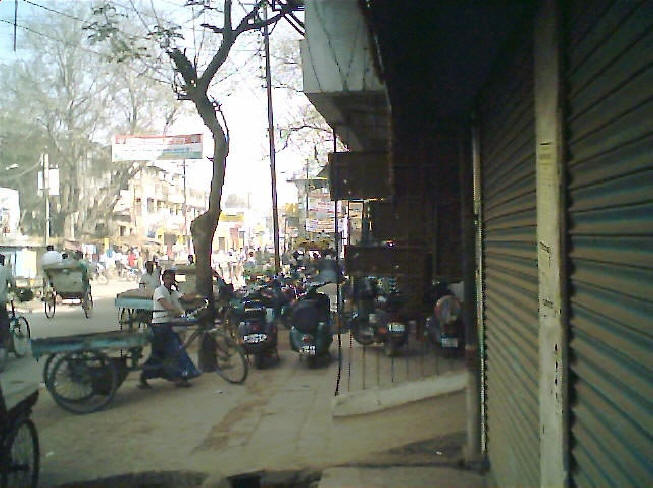
VARANASI: Panorama right to left of the area around the cyber cafe I
used near the Hindustan Hotel.
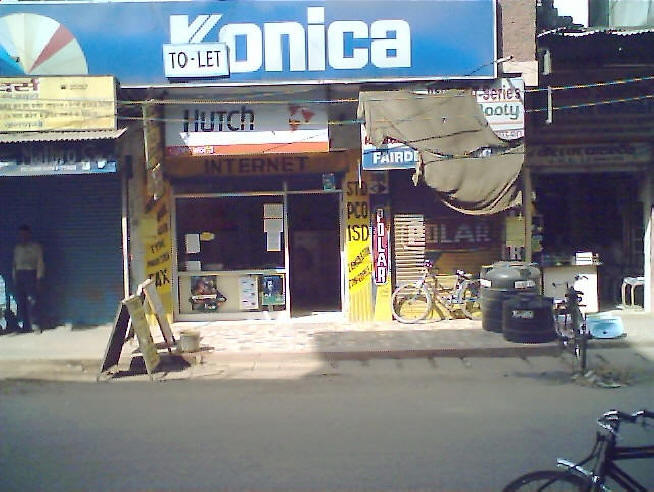
VARANASI: Panorama right to left of the area around the cyber cafe I
used near the Hindustan Hotel.
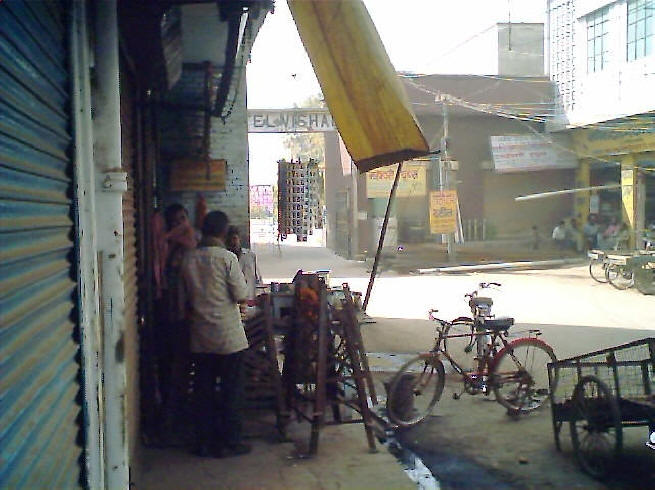
VARANASI: Panorama right to left of the area around the cyber cafe I
used near the Hindustan Hotel.
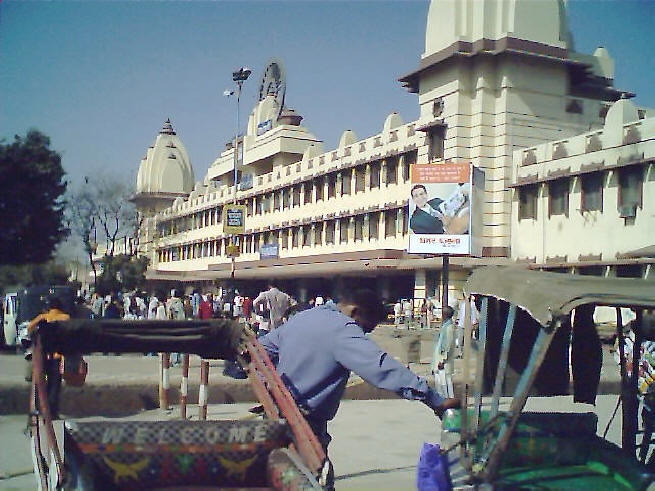
VARANASI: Here at the main railroad station a fleet of rickshaws
waiting for passengers.
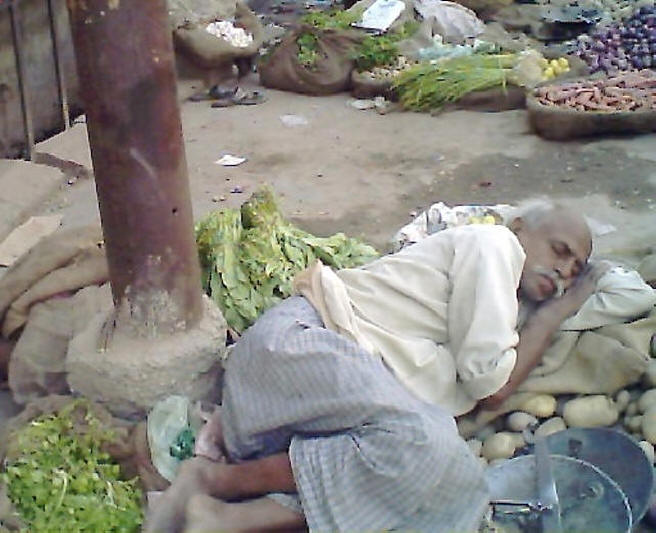
VARANASI: Taking a nap between sales.
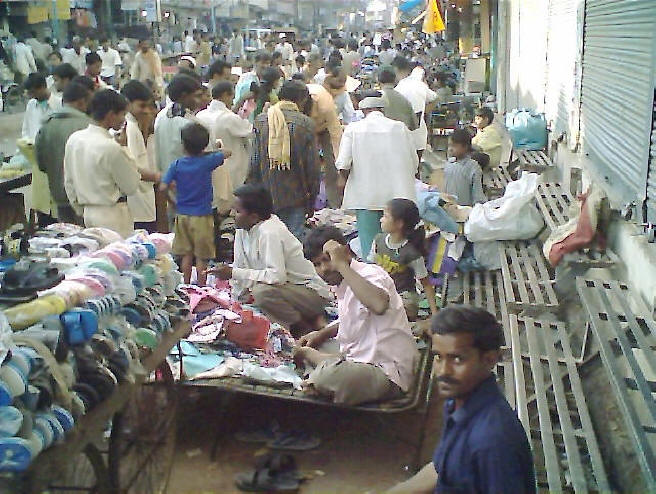
VARANASI: Big sale at the street market.
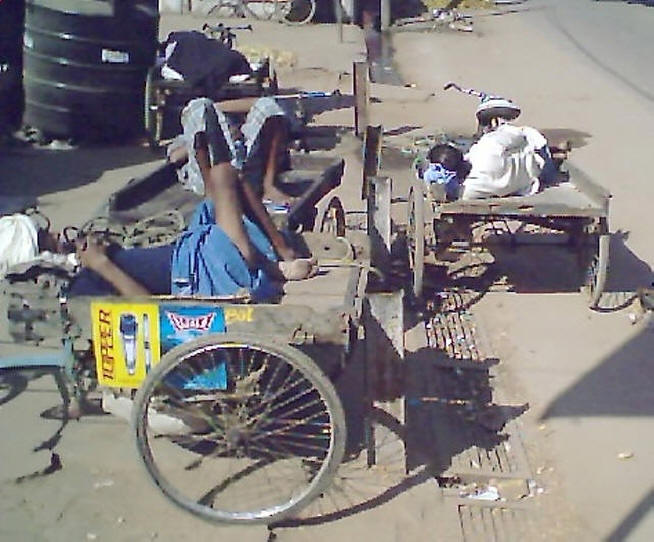
VARANASI: Delivery carts and their drivers taking a noon nap.
|
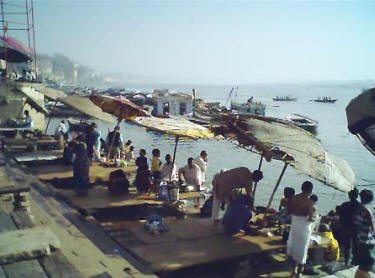
VARANASI: At the "main" Ghat "holy men" sit
waiting for clients wanting to be blessed.
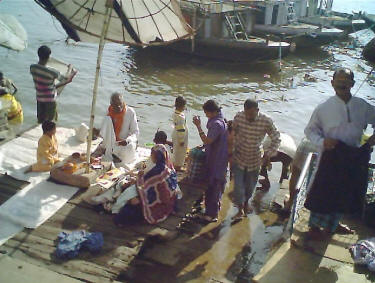
VARANASI: At the "main" Ghat "holy men" sit waiting for clients while boat
ride touts and others loiter about.
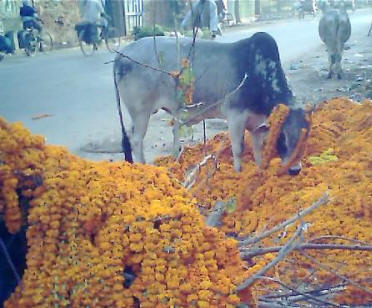
VARANASI: Where have all the flowers gone?
After one celebration or another piles of flowers are discarded. Here, holy
cows make this pile breakfast.
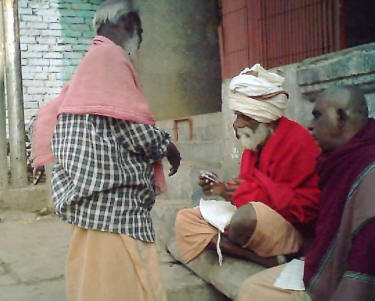
VARANASI: On the steps of a Ghat here showing another holy man... What's he
doing? Checking his beeper, I think.
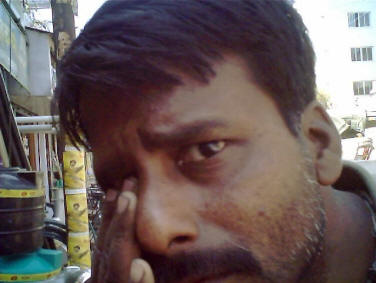
VARANASI: Let me take a closer look at that
camera. So, I poked it right in his face and tripped the shutter.
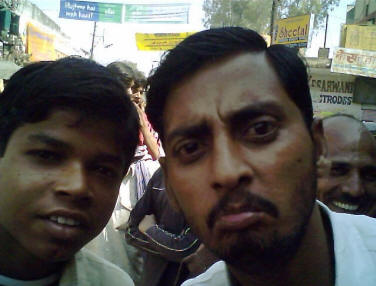
VARANASI: A couple more rickshaw drivers
wanted to take a close look as well.
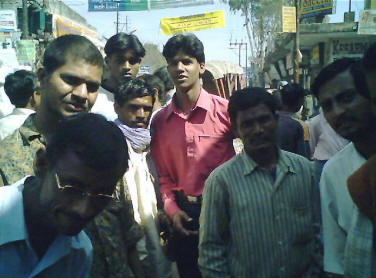
VERANASI: Pretty soon, every rickshaw driver in the area clustered around me
and my tiny white and orange wonder. What a great device for getting
close-up pictures of local people!
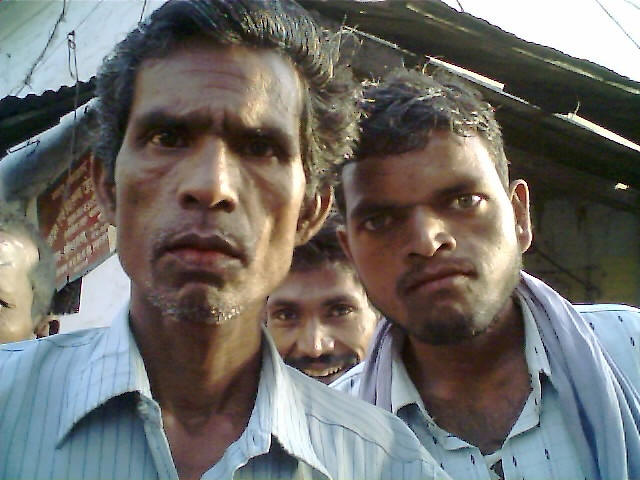
VARANASI: Photo taken as these curious men
inspect my white and orange gadget. They are not mad, just very curious!
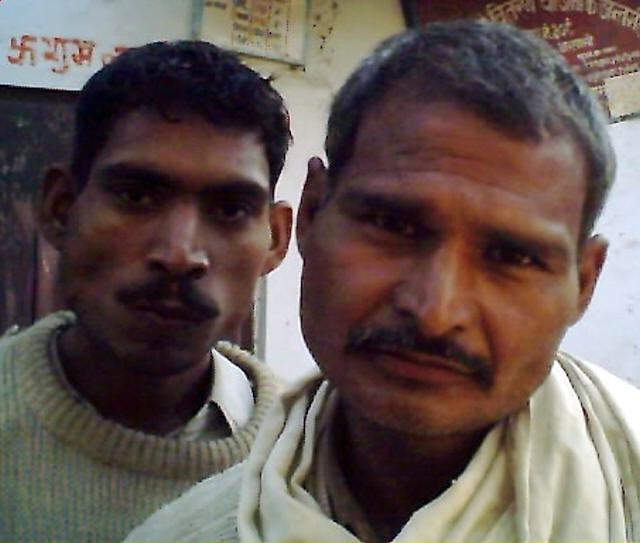
VARANASI: Another photo taken as these curious men inspect my white and
orange gadget. Like the others, they are just very curious!
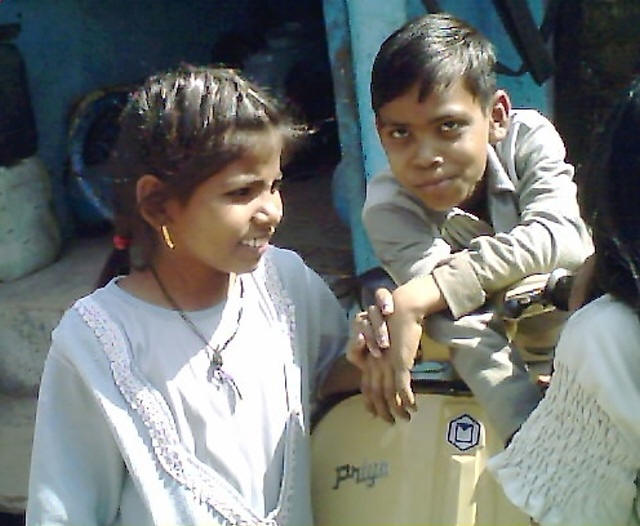
VARANASI: Three mischievous kids got
interested in my camera and indicated they wanted me to take their pictures.
One turned away, but these two continued to act up for the camera.
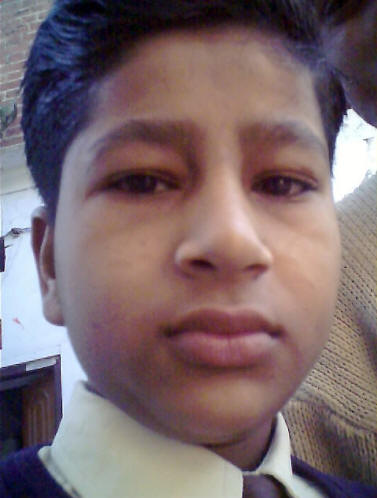
VARANASI: Another photo taken as this curious
kid takes a close look at my fancy tiny camera. The main problem with my
sneaky portrait technique is that hardly anyone ever smiles.
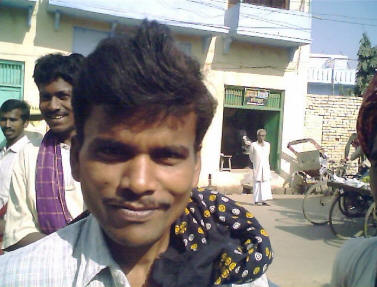
VARANASI: Another guy curious to have a look
at my camera. At least I caught him smiling.
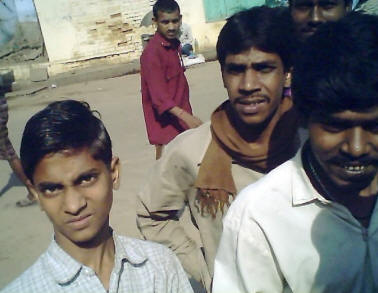
VARANASI: More guys curious to have a look at
my camera. I do get some strange portraits with this technique.
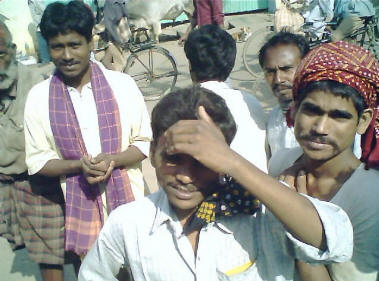
VARANASI: More guys curious to have a look. I
liked the turban on the guy to the right.
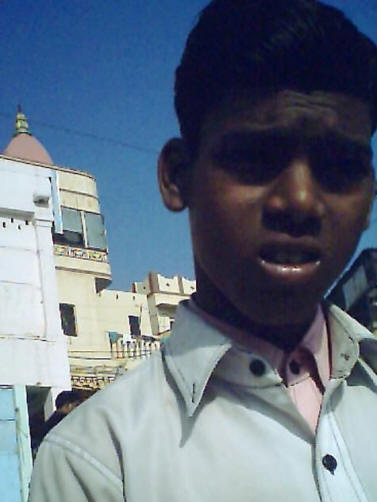
VARANASI: Another curious kid. Minutes earlier he smiled; now his expression
shows his intense curiosity as I hold out my camera for his inspection.
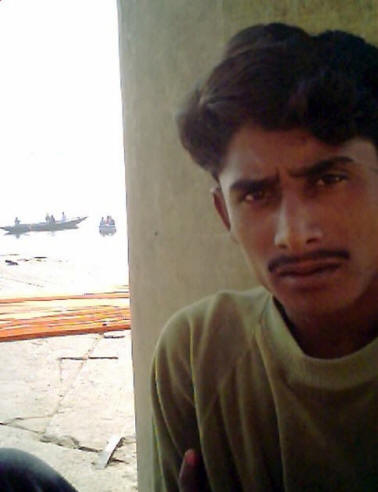
VARANASI: Another curious kid who fell for my
trick of holding the camera close for his inspection. After a while I got
pretty good at framing the subject in the center of the picture, unlike this
shot.
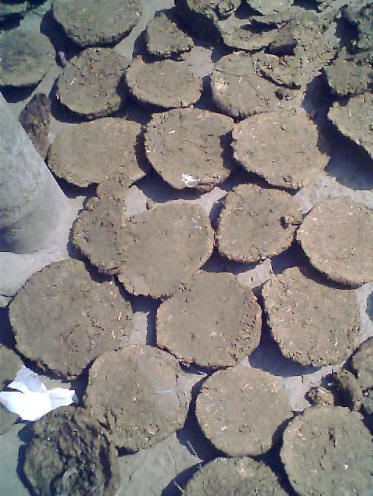
VARANASI: Nothing wasted. Here are the results of the efforts of little
girls who collect cow dung and make patties that are dried in the sun and
then used as fuel for cooking fires.
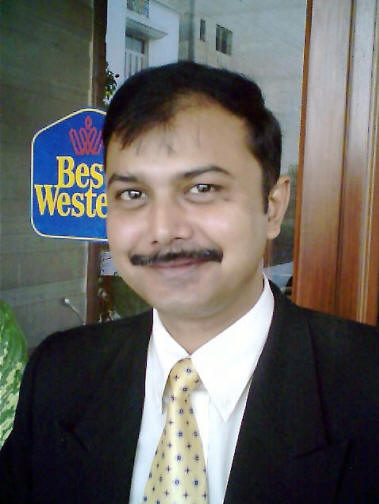
VARANASI: Meet Mr. Supradeep Chandra, sales manager of the Best Western
Hotel Hindustan International in Varanasi. After checking many hotels I
concluded the Hindustan is by far the best value for the single traveler. At
$40-44 and luxury facilities, it is hard to beat. As far as I can tell it is
the closest house to the principle tourist attractions, the Ghats.
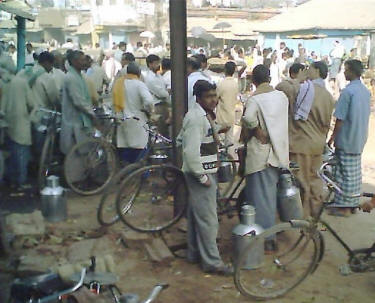
VARANASI: Milk distributors in the street
market near the "main" Ghat. These are the dairymen selling milk to people
who use their cupped hand to dip out a sample before deciding to buy... the
right hand, but who knows where that has been!
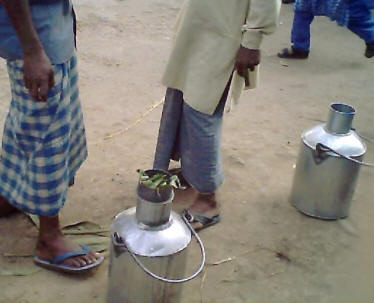
VARANASI: Milk distributors in the street
market near the "main" Ghat. Straw is wedged around the lid to keep it in
place.
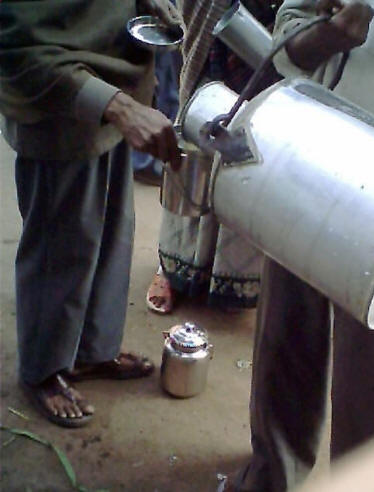
VARANASI: Milk distributors in the street
market near the "main" Ghat. These are the dairymen selling milk to people
who use their cupped hand to dip out a sample before deciding to buy... the
right hand, but who knows where that has been! I think I saw one customer
pay 15 Rupees for a liter; that's about 32 cents a quart!
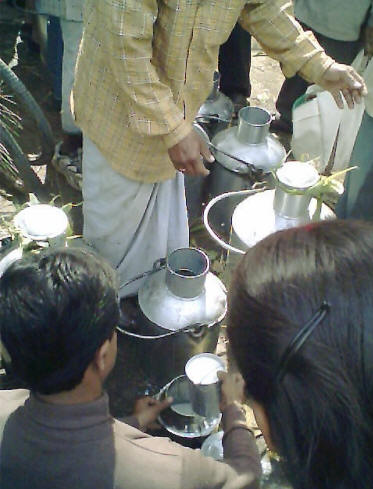
VARANASI: Milk collection and distribution center. I watched this scene for
several minutes as people skimmed leaves and other brown things from the
surface of milk being sold here. Having worked on a dairy, I suspected
anything less than excellent sanitation might not meet my finicky standards
here in India.
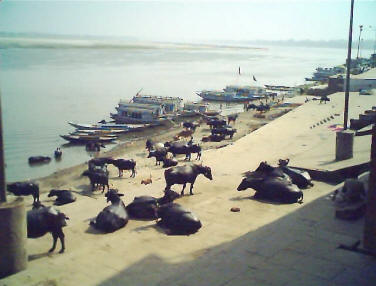
VARANASI: Even the cattle come down for a dip in the holy river.
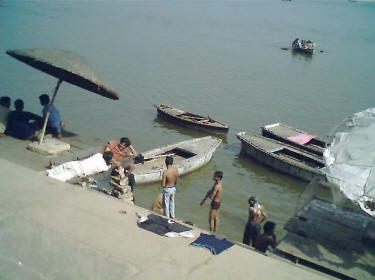
VARANASI: Swimming, bathing, boating: it is all here along the banks of the
Ganga River in the area of the Ghats, stone stairs leading down into the
river.
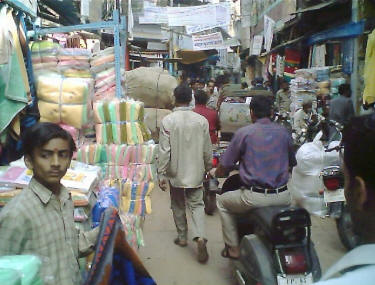
VARANASI: Motorcycles vie with pedestrians along one of the streets in the
maze of narrow shopping alleyways that wind their way through the area
adjacent to the river.
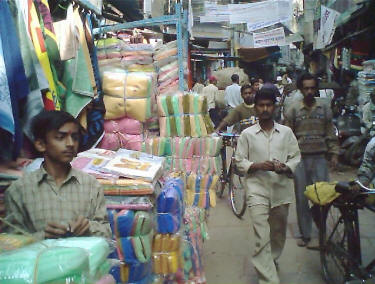
VARANASI: Bicycles are a popular mode of transport along one of the streets
in the maze of narrow alleyways that wind their way through the area
adjacent to the river.
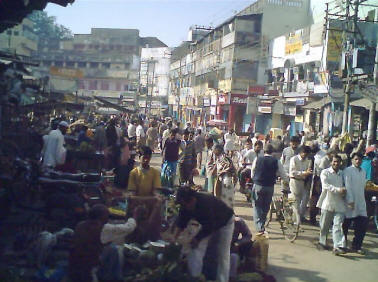
VARANASI: On one of the streets/alleyways along the buildings lining the
riverfront. People, bicycles, motorcycles, and cars crowd the way.
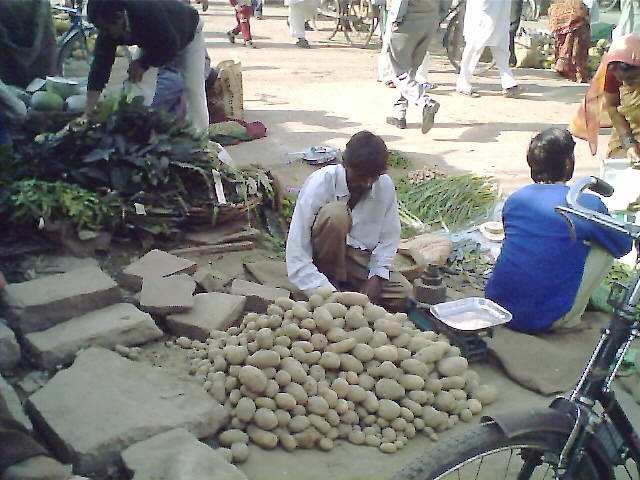
VARANASI: The potato seller.
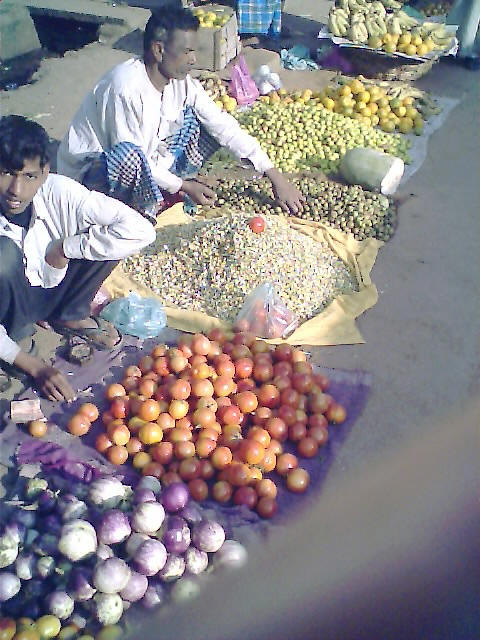
VARANASI: In the narrow, twisting alleyways of the galis people sell all
sorts of produce.
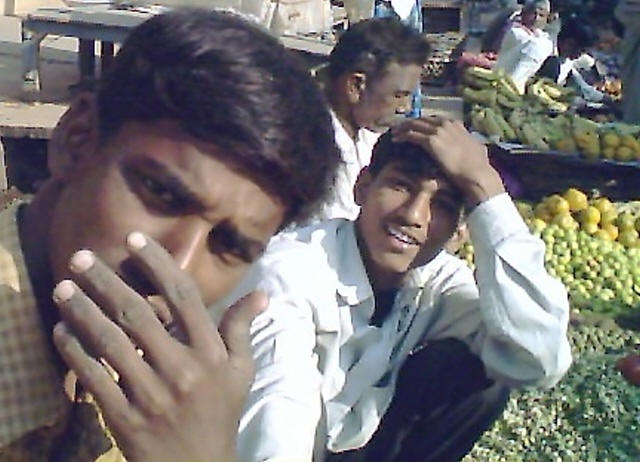
VARANASI: In the narrow, twisting galis these guys became fascinated by my
camera.
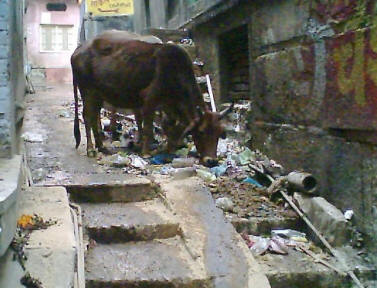
VARANASI: In the narrow alleyways of the galis side streets one see all
kinds of traffic; here cows.
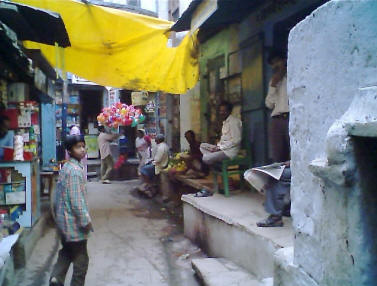
VARANASI: In the alleyways of the galis; a typical scene.
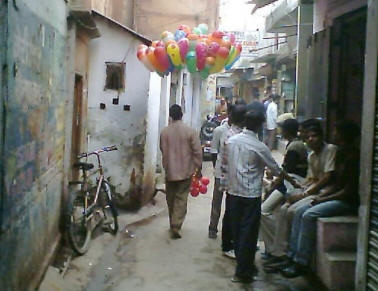
VARANASI: Another typical scene in the narrow galis.
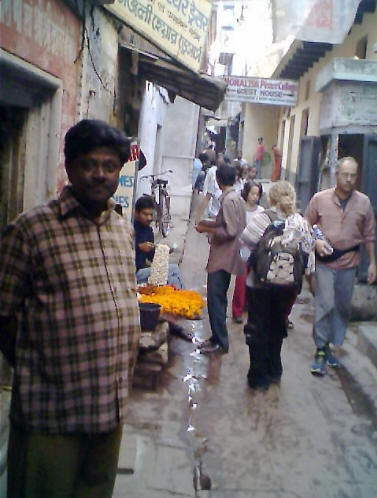
VARANASI: Residents mingle with tourists in the twisting galis alleyways; a
typical scene.
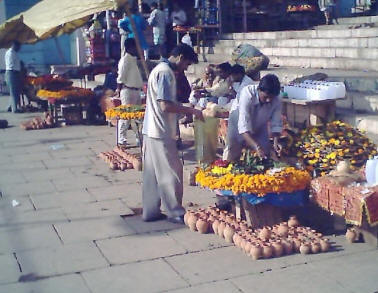
VARANASI: At the "main" Ghat sellers offer things devotional. The containers
are to carry some of the holy Ganga River water back home.
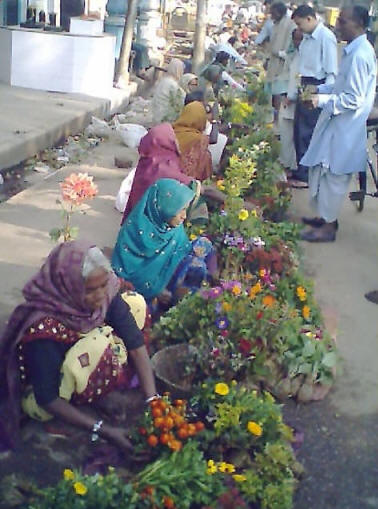
VARANASI: In the narrow, twisting alleyways of the galis I came upon these
flower sellers.
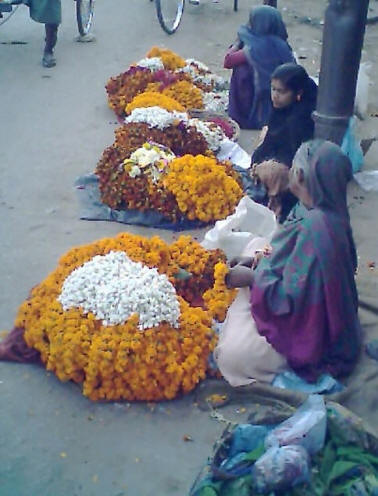
VARANASI: More flower sellers in the street market near the "main" Ghat.
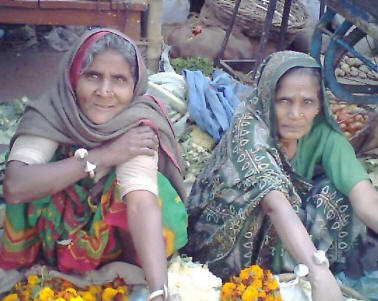
VARANASI: Friendly flower sellers indicated I
should take their picture.
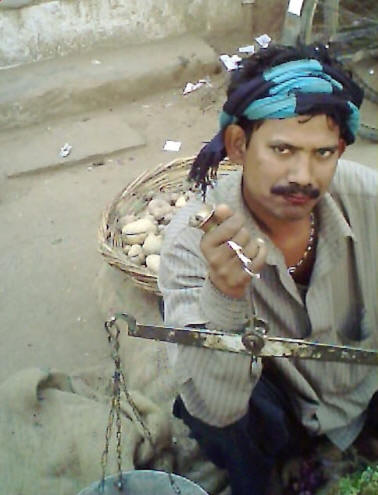
VARANASI: This is not the picture I intended
to take. This betel nut chewer had heavily stained teeth and smiled a lot.
The minute I snapped the photo he closed his mouth!
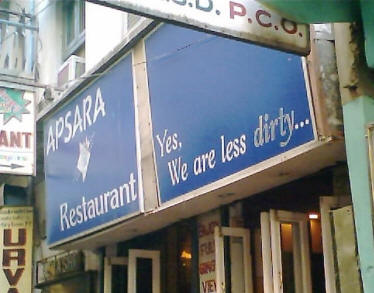
VARANASI: Someone has a great sense of humor... aided no doubt by the hoards
of backpackers which frequent this particular part of the river area.
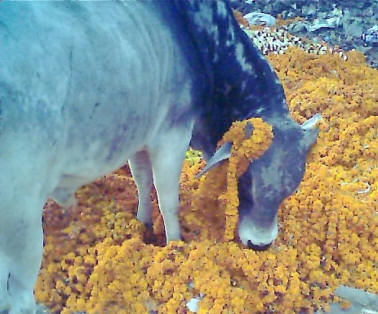
VARANASI: Where have all the flowers gone? After one celebration or another
piles of flowers are discarded. Here, holy cows make this pile breakfast.
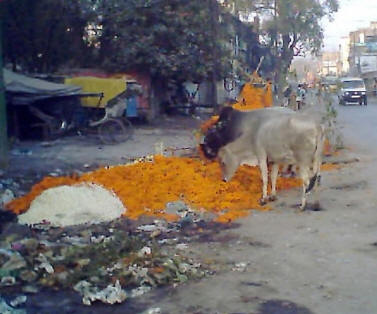
VARANASI: Where have all the flowers gone? After one celebration or another
piles of flowers are discarded. Here, holy cows make this pile breakfast.
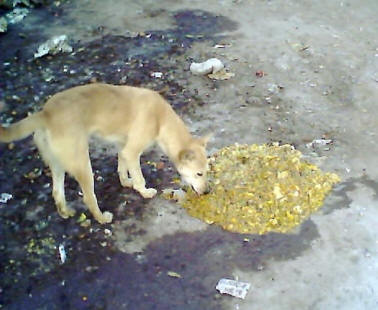
VARANASI: Left over vittles from the same celebration I presume, attracts
the attention of a stray dog. She decides curry is not to her liking...
sniffs, tastes and wanders away. Worry not; nothing here is wasted.
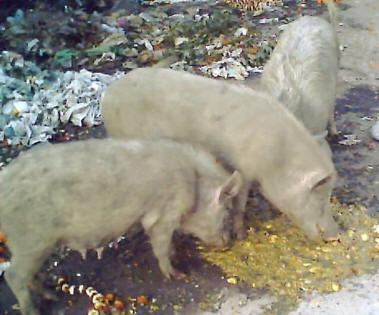
VARANASI: Pigs make a feast of food thrown out after a party last night. A
dog earlier refused to eat it!
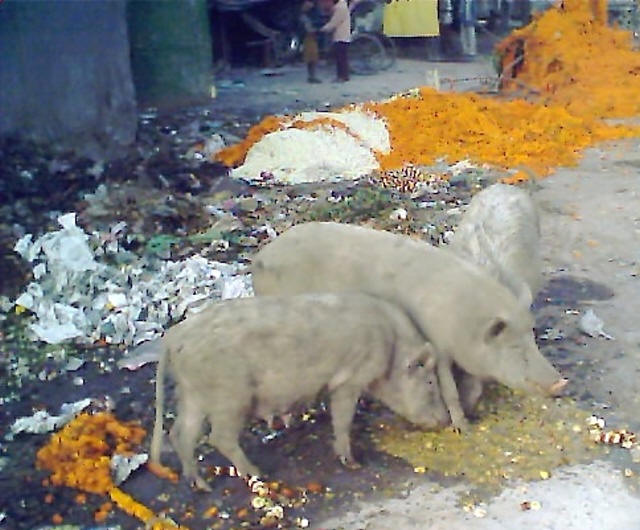
VARANASI: Pigs are less fussy and make a feast of food thrown out after a
party last night. A dog earlier refused to eat it!
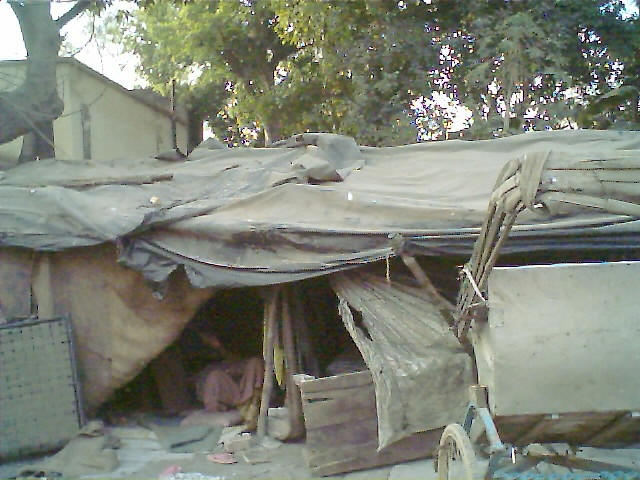
VARANASI: This makeshift dwelling formed the background for the pile of
flowers and I later noted human forms barely visible in the dark interior
watching the strange antics of the foreign tourist with the tiny white and
orange "thing" he kept waving around.
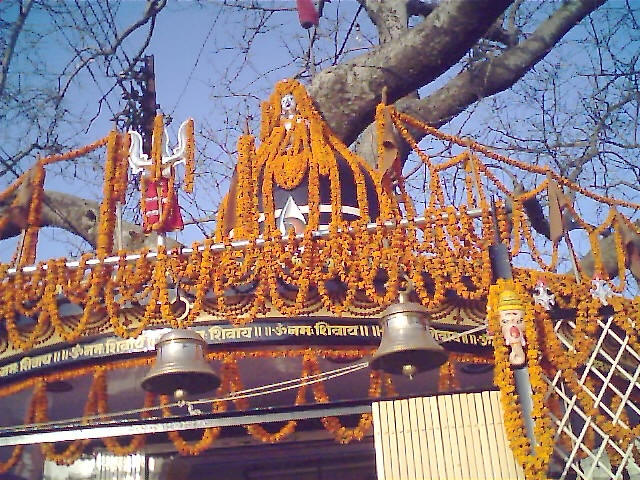
VARANASI: One of the hundreds of small "temples" located around the City of
Lights.
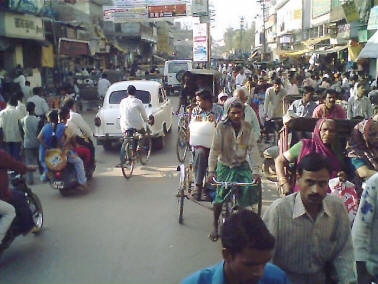
VARANASI: Part of the one billion Indians crowd streets along the market
area.

Philips Key007 Digital Camera Key Ring. This
is the little white and orange thingy that attracted so much attention on
the streets of Varanasi. All of the photographs on this page came from this
little gadget... as did all the pictures taken during my exploration of
India and China during 2004.
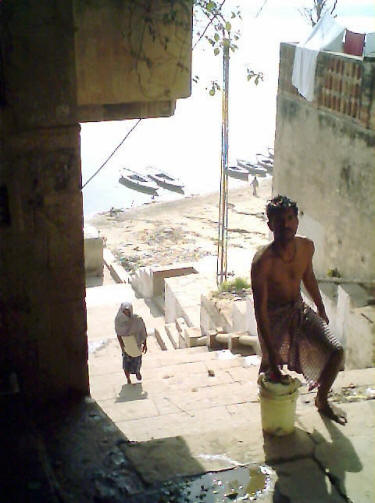
VARANASI: A typical scene along the banks of the Ganga River in the area of
the Ghats, stone stairs leading down into the river.
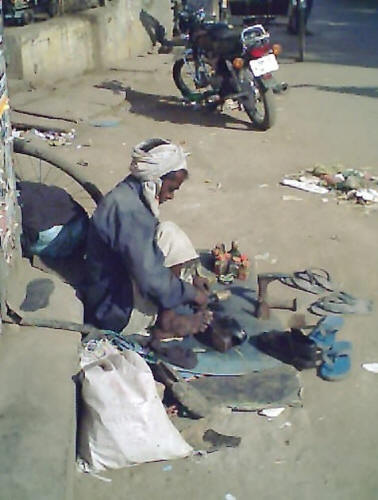
VARANASI: A street cobbler at work. I stood watching him for several minutes
without him taking notice.
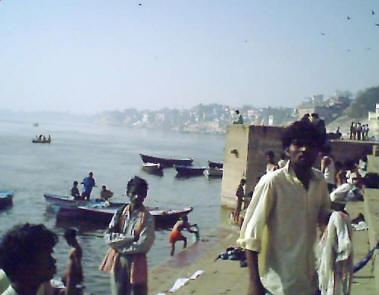
VARANASI: On the steps of a Ghat here showing a tout who just asked me if I
wanted to rent his boat service.
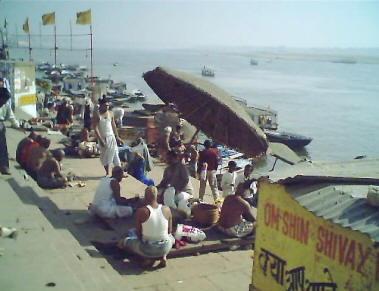
VARANASI: On the steps of a Ghat here showing how the waiting holy men keep
from getting sun burned.
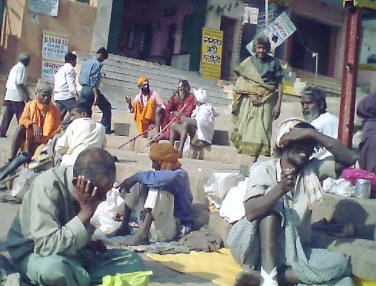
VARANASI: On the steps of a Ghat here showing a gathering of holy men and
others.
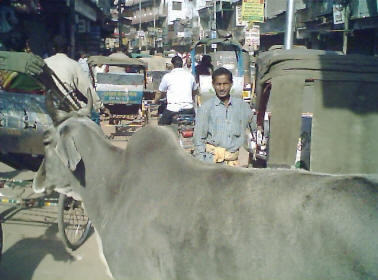
VARANASI: In one of the alleyways near the Ghats. Here a cow blocks the way.
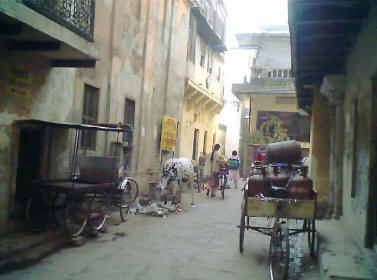
VARANASI: In the narrow, twisting alleyways cows, bicycles, rickshaws and
motorcycles compete for passage.
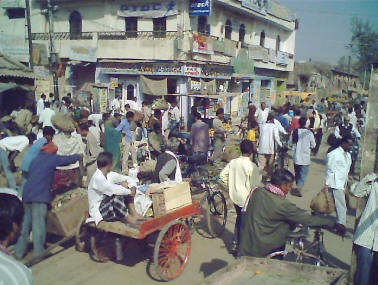
VARANASI: Street market scenes near the hotel one morning during rush hour.
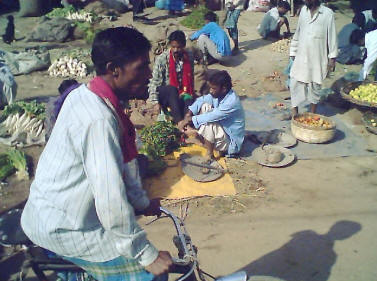
VARANASI: Street market scenes near the hotel one morning during rush hour.
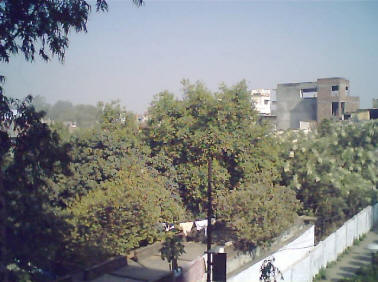
VARANASI: View from my room #102 in the Hotel Hindustan International.
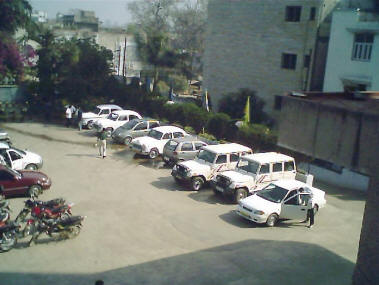
VARANASI: View from my room #102 in the Hotel Hindustan International.
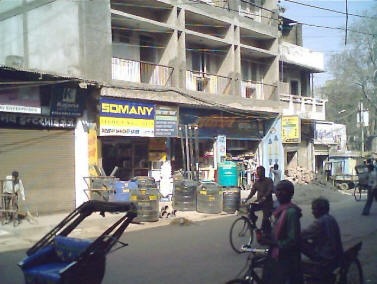
VARANASI: Panorama right to left of the area around the cyber cafe I used
near the Hindustan Hotel.
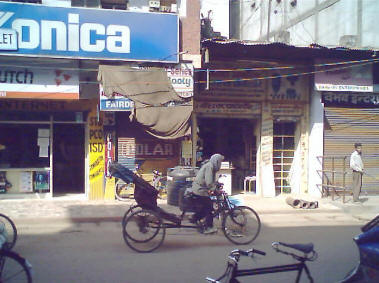
VARANASI: Panorama right to left of the area around the cyber cafe I used
near the Hindustan Hotel.
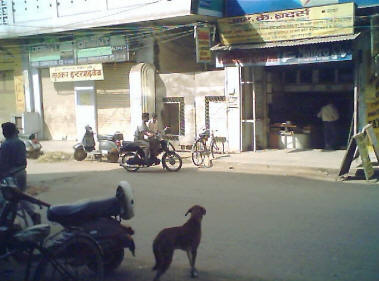
VARANASI: Panorama right to left of the area around the cyber cafe I used
near the Hindustan Hotel.
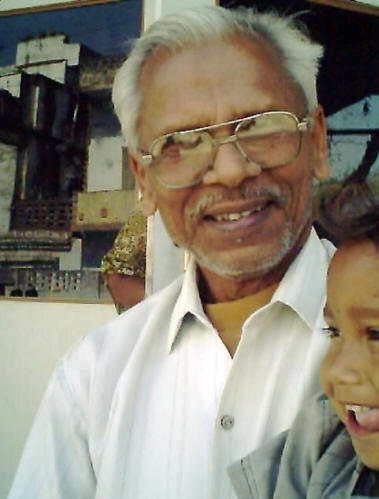
VARANASI: Cute baby and proud grandfather.
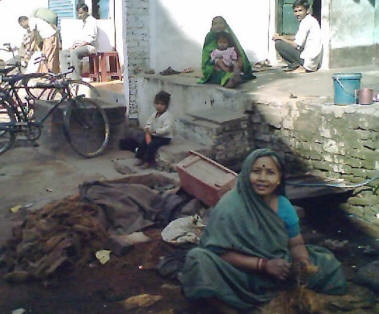
VARANASI: One of the women processing coconut husks for rope. She indicated
for me to take her picture.
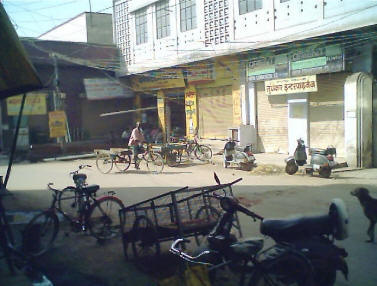
VARANASI: Panorama right to left of the area around the cyber cafe I used
near the Hindustan Hotel.
|


